2013
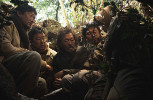
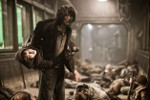
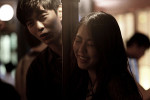
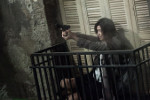
"Jiseul", "Snowpiercer", "Very Ordinary Couple", "The Berlin File"
After a record-breaking box office run in 2012, Korean cinema continued to flex its muscles in the early part of 2013. Theatrical admissions for local films in the first quarter of 2013 were the highest of any three-month period in Korean film history, thanks to hits like Ryoo Seung-wan's The Berlin File, gangster epic New World and especially the sentimental comic drama Miracle in Cell No. 7. The latter film, featuring an ensemble cast led by RYU Seung-ryong, became the third best-selling Korean film in history with close to 13 million admissions.
Another film that drew much notice was the low-budget feature Jiseul, about 1948 massacre of civilians on the island of Jeju. Shot in Jeju dialect, the exquisitely crafted film won the top prize in the World Dramatic Cinema competition at Sundance before opening in Korea in March. Positive word-of-mouth then helped the film to achieve a level of publicity and box office success almost unheard of for independent films.
The early part of 2013 also marked the anticipated Hollywood debuts of Korean directors Park Chan-wook (Stoker) and Kim Jee-woon (The Last Stand). Although not technically Korean films, these works are of great interest to many fans of Korean cinema, so we will be providing a separate page (coming soon) for reviews of these and other "not quite Korean" films.
Looking ahead to the rest of 2013, the one massive project on the horizon is Bong Joon Ho's SF epic Snowpiercer, expected to reach theaters in August. Although shot mostly in English with an international cast, it was produced in Korea, and is the source of much anticipation. Other upcoming films include The Face Reader by Han Jae-rim who previously directed The Show Must Go On; Hwayi by Save the Green Planet director Jang Jun-hwan; and a big-budget 3-D baseball movie Mr. Go featuring a CG animated gorilla, from the director of 200 Pound Beauty and Take Off. (Written on April 11)
Reviewed below: The Berlin File (Jan 30) -- How to Use Guys with Secret Tips (Feb 14) -- New World (Feb 21) -- Nobody's Daughter Haewon (Feb 28) -- Jiseul (Mar 21) -- Very Ordinary Couple (Mar 21) -- Horror Stories 2 (Jun 5) -- Cold Eyes (Jul 3) -- The Terror Live (Jul 31) -- The Face Reader (Sep 11) -- Our Sunhi (Sep 12) -- The Russian Novel (Sep 19) -- Hwayi: A Monster Boy (Oct 9) -- City: Hall (Oct 24) -- Blood and Ties (Oct 24) -- The Commitment (Nov 6) -- Steel Cold Winter (Nov 7) -- The Fake (Nov 21). -- AM 11:00 (Nov 28). -- The Attorney (Dec 18).
| Korean Films | Nationwide | Release | Revenue | |
|---|---|---|---|---|
| 1 | Miracle in Cell No.7 | 12,811,206 | Jan 23 | 91.4bn |
| 2 | The Attorney | 11,375,954 | Dec 18 | 82.9bn |
| 3 | Snowpiercer | 9,350,194 | Aug 1 | 67.0bn |
| 4 | The Face Reader | 9,134,581 | Sep 11 | 65.9bn |
| 5 | The Berlin File | 7,166,290 | Jan 30 | 52.4bn |
| 6 | Secretly Greatly | 6,959,083 | Jun 5 | 48.7bn |
| 7 | Hide and Seek | 5,604,103 | Aug 14 | 39.6bn |
| 8 | The Terror Live | 5,584,139 | Jul 31 | 39.8bn |
| 9 | Cold Eyes | 5,508,017 | Jul 3 | 39.3bn |
| 10 | New World | 4,682,492 | Feb 21 | 34.8bn |
| All Films | Nationwide | Release | Revenue | |
|---|---|---|---|---|
| 1 | Miracle in Cell No.7 (Korea) | 12,811,206 | Jan 23 | 91.4bn |
| 2 | The Attorney (Korea) | 11,375,954 | Dec 18 | 82.9bn |
| 3 | Snowpiercer (Korea) | 9,350,194 | Aug 1 | 67.0bn |
| 4 | The Face Reader (Korea) | 9,134,581 | Sep 11 | 66.0bn |
| 5 | Iron Man 3 (US) | 9,001,309 | Apr 25 | 70.8bn |
| 6 | The Berlin File (Korea) | 7,166,290 | Jan 30 | 52.4bn |
| 7 | Secretly Greatly (Korea) | 6,959,083 | Jun 5 | 48.7bn |
| 8 | Hide and Seek (Korea) | 5,604,103 | Aug 14 | 39.6bn |
| 9 | The Terror Live (Korea) | 5,584,139 | Jul 31 | 39.8bn |
| 10 | Cold Eyes (Korea) | 5,508,017 | Jul 3 | 39.3bn |
* Includes admissions from 2014. Source: Korean Film Council.
Seoul population: 10.4 million
Nationwide population: 50.9 million
As the film opens, North Korean intelligence officer Pyo Jong-seong (Ha Jung-woo, Yellow Sea, The Terror Live) is negotiating an arms deal with a band of Middle Eastern terrorists. They are monitored by South Korean N. I. S. (formerly K. C. I. A) operatives headed by Jeong Jin-soo (Han Suk-kyu, Villian and Widow). Something goes wrong, and a gunfight breaks out. Pyo barely escapes with his life, but manages to elude Jeong, obsessed with bagging him. It appears that someone in the North Korean embassy has been selling secrets and is now preparing to defect to the South. Pyo begins to suspect his estranged wife Ryeon Jeong-hee (Jeon Ji-hyun, a.k.a. Gianna Jang, The Thieves). Meanwhile the Northern headquarters is sending Dong Myung-soo (Ryoo Seung-beom, Perfect Number), a sadistic interrogator and cold-blooded assassin, to clean up the mess.
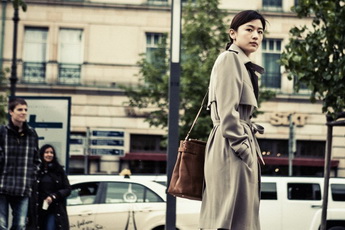 The Berlin File was one of 2013's biggest domestic hits (7.4 million tickets sold), not to mention the most financially successful film directed by the perennially under-appreciated Ryoo Seung-wan (The Unjust). Although apparently beset by a series of production difficulties, it is an impressively mounted thriller: efficient, dry-eyed and intelligent. Many domestic viewers compared the film to the Jason Bourne series, but despite a few superficial concession to the latter's fragmentary style, The Berlin File is a throwback to the "serious" espionage thrillers of '60s and '70s, films such as The Quiller Memorandum (1966, also set in Berlin and written by Harold Pinter), A Dandy in Aspic (1968) and Three Days of Condor (1975). Ryoo, who also penned the film's unusually (for him) taut screenplay, again seems to have achieved what he does arguably better than almost any other Korean filmmaker: to come up with a film firmly grounded in the Euro-American genre conventions and at the same time in the unique features of the Korean historical experience-in this case, a bona fide Cold War espionage film entirely bereft of nostalgia, for the simple reason that for North and South Koreans of today the Cold War still remains an unassailable "reality."
The Berlin File was one of 2013's biggest domestic hits (7.4 million tickets sold), not to mention the most financially successful film directed by the perennially under-appreciated Ryoo Seung-wan (The Unjust). Although apparently beset by a series of production difficulties, it is an impressively mounted thriller: efficient, dry-eyed and intelligent. Many domestic viewers compared the film to the Jason Bourne series, but despite a few superficial concession to the latter's fragmentary style, The Berlin File is a throwback to the "serious" espionage thrillers of '60s and '70s, films such as The Quiller Memorandum (1966, also set in Berlin and written by Harold Pinter), A Dandy in Aspic (1968) and Three Days of Condor (1975). Ryoo, who also penned the film's unusually (for him) taut screenplay, again seems to have achieved what he does arguably better than almost any other Korean filmmaker: to come up with a film firmly grounded in the Euro-American genre conventions and at the same time in the unique features of the Korean historical experience-in this case, a bona fide Cold War espionage film entirely bereft of nostalgia, for the simple reason that for North and South Koreans of today the Cold War still remains an unassailable "reality."
I initially approached The Berlin File with some trepidation, since what I had heard through grapevine about the film made me anticipate something on the order of a commercialized hybrid between The City of Violence (2006) and Park Chan-wook's Joint Security Area (2000), in which the North-South relations, perhaps in the form of a macho male-bonding between Northern and Southern agents, would be at the center stage. What I actually saw, however, was nothing like that. On the contrary, Ryoo's film departs from most current South Korean hits featuring North Korean agents, such as Secret Reunion (2010) and Secretly, Greatly (2013), in that he eliminates South Korea as a site of consumer-capitalist everyday activity into which pretty boy Northern agents have to assimilate themselves. Neither do, despite the crowd-pleasing presence of Han Suk-kyu, Southern agents play a significant role in The Berlin File.
Instead, the film works best when Ryoo focuses on the intolerable paranoia and distrust that poison and undermine the integrity of North Korean characters. Here, his casting of Ha Jung-woo and Jeon Ji-hyun is excellent. Ha may not be as brilliant as, say, Song Kang-ho, in conveying tormented psychological inner workings of the outwardly taciturn warrior, but he still commands the screen with bristling charisma (one of his best-known, pre-stardom stage roles, by the way, was, appropriately, Othello). Jeon matches him blow by blow as a radiant beauty whose disappointment in her husband (and her life) is eating her from inside out. And as usual, Ryoo Seung-beom is fantastic as a sadistic, leering North Korean assassin, who perfectly captures the mock-suave panache of a European-boarding-school-educated, jet set kid easing into a life of immediate (material) gratification and criminal activities. Indeed, Ryoo's Dong Myung-soo seems to be the perfect embodiment of the quasi-anarchic, utterly ruthless pursuit of power that seems to be the true credo of the North Korean rulers, beneath their Communist or nationalist flag-waving. You want Reunification? Be my guest: give Comrade Dong a hug, why don't you?
Ryoo stumbles somewhat in a series of extravagantly ambitious action sequences that build up to the film's finale, with its occasionally haphazard continuities and CG-rendered, cheap-looking explosions. Another problem is the strangely unconvincing characterization of Han Suk-kyu's Agent Jeong, compared to his Northern counterparts. His interaction with a C. I. A. old dog (John Keogh) is visibly clunky, what with the former's bizarre, hiya-ol'-buddy English diction (in contrast, Ryoo Seung-beom's mannered, ersatz-Middle-European-accented "Konglish" fits his character perfectly).
On the other hand, technical specs are dependably superior. DP Choi Young-hwan (The Thieves), reunited with Ryoo after a decade following their collaboration in No Blood No Tears (2002), and Lighting Director Kim Seong-gwan portray Berlin, through impressively extensive location shooting, as a city pregnant with old secrets, bustling with busy population yet pocketed with dark corners and wood-paneled back rooms. The hand-to-hand combat choreography, designed by Ryoo's longtime collaborator Jeong Doo-hong and Seoul Action School, actually works better when it is essentially two people smashing each other with various kitchen implements and office tools in a narrow apartment corridor. In the end, exciting and beautifully rendered as they are, I cannot help wonder if the movie really needed these head-spinning action set pieces.
All in all, The Berlin File is a flawed but terrific and gutsy espionage film. Rather than paying lip services to the "Northerners are human beings too" rhetoric of ethnic reconciliation, the film addresses the fact that the Cold War ideology still survives in North Korea precisely because it serves the interests of the top-of-the-food-chain jackals like Dong (and his clan, the paterfamilias of which is played by Myung Gye-nam in an amusing cameo), who continued to fatten themselves at the expense of ordinary working stiffs like Pyo and Ryeon. As Dong sneers at one point, "People always change," even if the ideology remains unchanged. (Kyu Hyun Kim)
![]() How to Use Guys with Secret Tips
How to Use Guys with Secret Tips
Choi Bona is overworked and underpaid in one of Korea's most selfless jobs: she is an assistant director. Casually disregarded by her work colleagues, she knows that her career is going nowhere, but there's nothing she can do about it. One night she hits bottom. Stranded on a beach in the middle of nowhere, she comes across an eccentric middle-aged man selling inspirational videos. He urges her to buy his masterwork, "Instructions on How to Use Men," telling her that it will change her life, and give her the skills she needs to find success and happiness. She doesn't believe him for a second. But she buys the video.
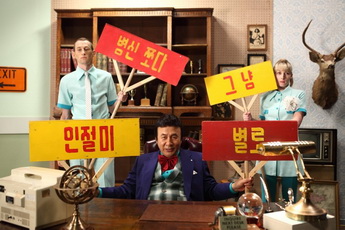 How to Use Guys with Secret Tips is in some ways a fairly standard Korean romantic comedy, except that it's funnier and more engaging, and ultimately much better than you would expect. Director Lee Won-suk, a graduate of the American Film Institute, maintains great comic timing and even manages to keep the audience's interest in the final reels, which are a weak point of many Korean romantic comedies. Boosted by great performances and a multitude of gags that are genuinely funny, the film produced strong word-of-mouth among viewers, though not soon enough to save it in a month when it was sharing screens with box office behemoths The Berlin File, New World and Miracle in Cell No. 7.
How to Use Guys with Secret Tips is in some ways a fairly standard Korean romantic comedy, except that it's funnier and more engaging, and ultimately much better than you would expect. Director Lee Won-suk, a graduate of the American Film Institute, maintains great comic timing and even manages to keep the audience's interest in the final reels, which are a weak point of many Korean romantic comedies. Boosted by great performances and a multitude of gags that are genuinely funny, the film produced strong word-of-mouth among viewers, though not soon enough to save it in a month when it was sharing screens with box office behemoths The Berlin File, New World and Miracle in Cell No. 7.
Much of the buzz surrounding this film centers on the two charismatic leads. Lee Si-young has an unusual star image: she is unique in simultaneously pursuing a career as an actress, while also competing as an amateur boxer. Lee originally learned boxing as part of her preparation to act in a TV drama, but then she continued training and eventually won several amateur boxing championships in the 48kg weight category. Although this doesn't bear directly on her role in How to Use Guys with Secret Tips, her slightly "tough" image remains in the back of viewers' minds, and is toyed with in certain scenes.
The actor playing opposite her, Oh Jung-se, portrays a massively popular star who initially treats Bona with disdain, but later falls for her charm. Oh is a theater actor who has appeared in many supporting roles over the years, but his performance in this film has earned him special attention. Despite being the object of ridicule in numerous scenes, his underlying, offbeat charm runs constant throughout the film. Praise is also due to the veteran Park Young-gyu (Attack the Gas Station), who plays the video salesman and appears as the presenter in the video segments themselves. These short instructional clips, which run intermittently throughout the narrative, are deadpan, intentionally amateur in style, and hilarious.
Korean romantic comedies seem to be maturing in some ways, or at least adapting themselves to new circumstances. Whereas five or ten years ago, female protagonists tended to fluctuate between na?ve innocence and manic/cute aggression a la My Sassy Girl, the women of today's romantic comedies are more levelheaded and practical. The movie couples of the past used to do barely much more than hold hands, but contemporary romantic comedies have become more comfortable with the idea that young couples actually have sex. There remains plenty of coy posturing and cuteness in the genre, but the male leads have become a little more relaxed and self-effacing, while the female leads now retain a bit more of their dignity.
These qualities are one reason that How to Use Guys with Secret Tips feels fresh and new, but it is also simply a very well executed film. In a genre that looks easy, but is actually quite challenging, this is a significant accomplishment. (Darcy Paquet)
A large truck barrels down an empty street and crashes into a passing car. This single incident throws the inner workings of the Goldmoon crime syndicate into chaos, since the powerful boss of the group had been sitting in the car's back seat. Hierarchies and power relations which had formerly been stable are now suddenly in flux. A conflict seems likely between the gang's unpredictable #2 figure Chung (Hwang Jeong-min, Blades of Blood, The Unjust) and the smoother, highly ambitious #3 figure Joong-gu (Park Seong-woong).
 But unbeknownst to the higher ranking members of the gang, the local police force is also gathering information from the inside, and using it to further their own ends. Chung's most trusted subordinate Ja-sung (Lee Jung-jae, The Thieves) is actually an undercover cop, who has successfully infiltrated himself into the gang and earned their trust. After eight years of nail-biting tension, and with a baby on the way, he is now anxious to extract himself from the gang and retire. But his handler Chief Kang (Choi Min-sik) wants him to stay on, and is willing to play hardball in order to keep him in line.
But unbeknownst to the higher ranking members of the gang, the local police force is also gathering information from the inside, and using it to further their own ends. Chung's most trusted subordinate Ja-sung (Lee Jung-jae, The Thieves) is actually an undercover cop, who has successfully infiltrated himself into the gang and earned their trust. After eight years of nail-biting tension, and with a baby on the way, he is now anxious to extract himself from the gang and retire. But his handler Chief Kang (Choi Min-sik) wants him to stay on, and is willing to play hardball in order to keep him in line.
Korea has no shortage of gangster movies. There are gangster comedies, gangster romances, gangster coming-of-age dramas, gangster horror, and run-of-the-mill gangster films about well-intentioned young men who get pulled into crime and end up in the midst of ugly gang battles. Despite the diverse settings and variations in tone that you see among this group of films, they are all essentially melodramatic in the sense that we are made to identify with one or two victim-heroes who are up against forces much stronger than they are. Sometimes they win and sometimes they lose, but in the course of fighting their struggle, their inner goodness or sense of honor is revealed to the audience.
Park Hoon-jung's New World does not depart entirely from this formula, in the sense that we do empathize deeply with the plight of the embedded police officer played by Lee Jung-jae. But Park's approach is more expansive that of most other Korean gangster films. Ultimately he is less focused on the psychology of his main characters, and more concerned with exploring the structures and mechanisms of power within the gang. He describes it as a film about "gangsters doing politics," and that is essentially what his characters must do in order to maintain their grip on power. The cat and mouse game played with the local police force only adds another layer of complexity to the narrative.
Korean viewers, who pushed the film's box office score to an impressive 4 million+ admissions, were particularly enthused by the performances of the lead actors. Oldboy lead Choi Min-sik has enjoyed a career revival of late, with his appearances in I Saw the Devil and Nameless Gangster: Rules of the Time. In New World he gives a layered portrayal of Chief Kang, whose strong motivation to bring the criminals to justice leads him to treat his subordinates unfairly. Hwang Jeong-min, for his part, is both repellent and charismatic as the impulsive and extroverted Chung. Finally Lee Jung-jae is very effective at expressing the anguish and panic his character feels but desperately tries to keep hidden from view. Although an acting veteran of some 20 years, his performance in this film caused many viewers to look upon him with new eyes.
Although some have criticized New World's noticeable resemblance to Infernal Affairs and The Godfather (a film that the director claims to have watched more than 100 times), I think this film does represent something new. It has a scope and depth that is unusual for Korean films of this genre. A sequel is also likely to emerge in the coming years, given that the original screenplay contained vastly more material than could fit into one feature film. It would be an exaggeration to call this film the Korean Godfather, but it leaves a pretty strong impact, and I for one would be quite interested in watching New World 2. (Darcy Paquet)
There is a lovely moment in Hong Sangsoo's Nobody's Daughter Haewon where titular Hae-won (Jung Eun-chae, Haunters and King's Wrath) and Sung-joon (Hong regular Lee Sun-kyun, Oki's Movie, and Our Sunhi) share a truly beautiful, lovingly tender moment. It is when they are listening to a moving song on Sung-joon's cassette player. "Listening to music like this is better than reading 100 books", says Hae-won, to which Sung-joon agrees. The smiles on their faces are pure bliss. Then they kiss. As far as I can recollect, it is the sincerest, most romantic moment ever shared between lovers in a Hong film.
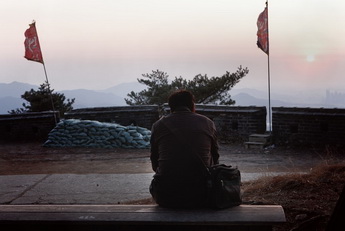 Which means it must quickly be ruined. It isn't torn asunder immediately, that comes a bit later when Sung-joon's patriarchal delusions of ownership of a woman's body is destroyed by the reality that Hae-won's body is her own to share with whom she pleases. No, this romantic moment is initially hastily tainted by Sung-joon's paranoia that they are being watched, that their rendezvous will be spotted by the wrong people, people who could destroy his marriage or his teaching gig by starting rumors. Of course, such things aren't rumors when they are true.
Which means it must quickly be ruined. It isn't torn asunder immediately, that comes a bit later when Sung-joon's patriarchal delusions of ownership of a woman's body is destroyed by the reality that Hae-won's body is her own to share with whom she pleases. No, this romantic moment is initially hastily tainted by Sung-joon's paranoia that they are being watched, that their rendezvous will be spotted by the wrong people, people who could destroy his marriage or his teaching gig by starting rumors. Of course, such things aren't rumors when they are true.
What this structure allows for is an example of how a song's impact can be shifted as the mood of the scenes shift. When we first hear it, the song sounds lovely because it's juxtaposed with a sweet, tender moment of affection. Yet when Sung-joon listens to it later after ending their relationship, the song becomes foreboding and depressing. (This is a Hong film, so we don't know if the relationship is officially over. It's just as likely that these characters might continue to repeat their destructive patterns with each other.) Hong's films have always provided moments of dissonance with romantic tropes. For the most part, the characters do not reconcile themselves. They neither reconcile in order to live happily ever after nor do they reconcile with themselves after a break-up. Hong's films don't allow for us to obtain stable grounding or a state of conflict/tension resolution. We are mostly left in discomforting anticipation that there are more awkward moments for these characters to pass through after the end credits roll.
The plot is not why you watch a Hong film, but if we must, Nobody's Daughter Hae-won begins similar to In Another Country, with Hae-won writing in her journal. She quickly falls asleep, however, and dreams of herself and English actress Jane Birkin. She awakes late to meet her mother on the day before her mother leaves to live with Hae-won's brother in Canada. They spend some time walking through her mother's nostalgia, that is, the school she used to attend. They end their time together at a bookshop. This bookshop, along with her mother's schoolground, an old fort that is a tourist attraction, and the coffeehouse next to the bookshop, each will be points of return in this film. Feeling lonely, Hae-won calls up a professor, a film director named Sung-joon, (Hae-won is studying acting), with whom she had a brief affair. (Sung-joon is married, making their relationship doubly inappropriate and, being that this is South Korea, illegal for Sung-joon.) They walk to a restaurant at which many of Sung-joon's students, also Hae-won's classmates, happen to be drinking and eating. Hence begins the Hong standard bearer - the awkward drinking scene. The rest of the film follows Hae-won and Sung-joon working out their ambivalence about their relationship. This ambivalence is heightened when Hae-won meets up with her friend later who is also involved with a married man. In the middle of all that, there is a professor from the U.S. who propositions Hae-won quickly after first meeting her, providing Hae-won a way out of her stunted relationship w/ Sung-joon and a way out of South Korea. Yet all of this is wrapped up in the possibility of being dreams or memories. See, Hae-won falls asleep a lot, at the coffeehouse or the library. So we have to hold much of what we see as suspect because along with characters not being trustworthy, it all might be a dream.
Nobody's Daughter Hae-won continues on a refreshing recent focus of Hong's where the entire film is told from a female character's perspective. Although he's had sections of films that focused on female perspectives before, as well as a short entitled "Lost in the Mountains", this all began with last year's film, In Another Country. Since her mother is leaving for Canada, her lover is a married man with a child, and her fellow students are quick to convey their disrespect for her in her absence, Hae-won is a woman alone. She is as alone as any of the men we have followed in Hong's films before.
Recent discussions I've had about Hong's films have been centering on the limited radius surveyed in many of his films, where the terrain is clearly demarcated to one neighborhood and the same paths are often taken, such as Bukchon district in The Day He Arrives or the tiny seaside resort of Mohang in In Another Country. Such decisively demarcated terrain partly arises from the low budget and compact filming time-line that constrains expansive location scouting, but Hong's films utilize this familiarity of the local for greater effect. Characters re-tread their steps like anyone would in neighborhoods they often frequent. As a result, the experiences of characters cannot be differentiated by the space they take place within because they keep taking similar routes and they keep re-living similar moments with nuanced differences at the same bookshop, the same cafe, the same historical sight, or alongside the same statue. Hae-won steps on a cigarette twice in the same parking lot, perhaps tossed by the same person or the same type of person who desires her, first a young man with facial hair whom her mother approves of and then an older professor from the U.S. We don't know for sure if the cigarettes which she stamps out were disposed of by these men or not, but we are slightly nudged to presume it is them, even if the one cigarette couldn't stay smoldering in the rain that long. The passage she reads in the journal at the cafe next to the bookshop is likely written by the young man, but the pick-up lines of the older professor mimic those journal-ed words as well, as if he's written them or just read them. The words could be sincere or they could be scripted lines practiced before the contrived meeting. Or it could be Hae-won's dreams re-sorting images and dialogue she's heard, read, or imagined before.
It is like the song Sung-joon plays on the cassette. It could be accompanying and enhancing love, it could be sadness. It has the potential for both. (Adam Hartzell)
Jeju island, November 1948. A group of South Korean soldiers infiltrate a mountainside village in the island, ostensibly looking for communist "rioters." The villagers, who cannot quite grasp seriousness of the situation, reluctantly evacuate into a cave, a traditional refuge site for them: they include Yong-pil (Yang Jeong-won) who cannot persuade his stubborn mother to escape with him: Mu-dong (Park Sun-dong), whose wife is pregnant: young Man-cheol (Seong Min-cheol), who decides to sneak back into the occupied village, believing that one of the girls he has a crush on, Sun-deok (Gang Hui), was captured by the soldiers. Meanwhile, the soldiers, led by beastly Master Sergeant Kim (Jang Gyeong-seop), are mercilessly slaughtering every living being on sight: one of the educated soldiers, Corporal Baek (Baek Jong-hwan), wants to resist Kim's orders but is instead sucked into the ever-deepening whirlpool of brutalization and victimization.
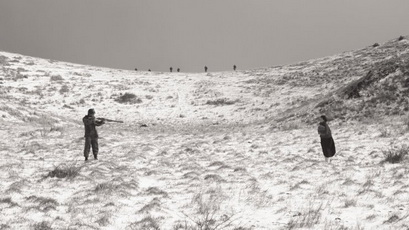 A winner of the World Cinema Grand Jury Prize at the 2013 Sundance Film Festival, Jiseul (which means "potato" in Jeju dialect: the standard Korean is gamja) is the fourth feature film from a Jeju-based indie filmmaker O Muel [O Myeol]. With a much bigger budget under his command than for his previous works Nostalgia, Pongddol and Iodo (not to be confused with the Kim Ki-young classic) director O fashioned, in beautiful and evocative black and white, a unique film that has abundant cross-cultural emotional appeal but at the same time is anchored firmly in the local identity of the Jeju islanders (A great deal of the dialogue, while Korean, is incomprehensible for the outsider Koreans without subtitled translations). Despite the de rigueur expository titles that identify the US Cold War policy as the ultimate source of the heinous acts committed by the soldiers, Jiseul, like Jeju-based writer Hyon Gil-on's stories ("Substance and Shadow," for instance), makes it pretty clear that "Koreans" have historically treated the islanders no better than "foreign invaders" (most recently the Japanese imperialists) had. The film is thus devoid of the "we are all brothers" ethnic-nationalist sentiment that sometimes dogs Korean films set in the immediate post-liberation period (roughly 1945 to 1953).
A winner of the World Cinema Grand Jury Prize at the 2013 Sundance Film Festival, Jiseul (which means "potato" in Jeju dialect: the standard Korean is gamja) is the fourth feature film from a Jeju-based indie filmmaker O Muel [O Myeol]. With a much bigger budget under his command than for his previous works Nostalgia, Pongddol and Iodo (not to be confused with the Kim Ki-young classic) director O fashioned, in beautiful and evocative black and white, a unique film that has abundant cross-cultural emotional appeal but at the same time is anchored firmly in the local identity of the Jeju islanders (A great deal of the dialogue, while Korean, is incomprehensible for the outsider Koreans without subtitled translations). Despite the de rigueur expository titles that identify the US Cold War policy as the ultimate source of the heinous acts committed by the soldiers, Jiseul, like Jeju-based writer Hyon Gil-on's stories ("Substance and Shadow," for instance), makes it pretty clear that "Koreans" have historically treated the islanders no better than "foreign invaders" (most recently the Japanese imperialists) had. The film is thus devoid of the "we are all brothers" ethnic-nationalist sentiment that sometimes dogs Korean films set in the immediate post-liberation period (roughly 1945 to 1953).
Indeed, Jiseul is neither a war film nor a conventional thriller. Unflinching, yet possessed of a strange, unhurried rhythm of its own, the work is at its best when it illustrates in a sort of magic-realist manner interactions of the villagers, who continue bickering, kibitzing, sharing jokes and doing other everyday activities, their mental state ranging from resignation for their state of constant escape from global politics to suppression of growing anxiety and fear, and finding brief moments of calmness and joy in between. Some viewers might be bothered by the transition from brutal depictions of the carnage (replete with daring infusions of black humor) to almost serene scenes of the villagers, most strikingly framed inside a cave as if they are a clueless group of jurors bound to serve in the trial for the crime of their own obliteration. The languidly dissolving shots of the villagers sharing cooked potatoes and conversing with one another, as the cave slowly lapses into total darkness, are positively uncanny, despite (perhaps deliberately) amateurish acting by some personages.
By the film's emotionally galvanizing yet supremely spiritual ending, I realized to my astonishment that director O Muel has turned the entire project of feature filmmaking into a public ritual of mourning for the victims of the massacre, summoning and acknowledging their spirits through the acts of re-creating not only their agonizing deaths, but also their ordinary lives, including moments of fleeting happiness. By watching the movie, we are allowed to participate in a shamanistic ritual that recalls and rehabilitates the "little" voices ground out by the grand narratives of nation-building and ideological conflict: it recalls a host of other films including The Devils on the Doorstep (2000) and Taviani Brothers' Night of the Shooting Stars (1982) in their juxtapositions of mundane, rustic everyday life and the political tragedies taking place in the larger domain, but Jiseul's earthbound-deity's camera-eye is completely original. Jiseul puts to shame most mainstream movies, both left-nationalist and right-anti-communist, which purport to "humanize" the perpetrators and victims who lived through (and died) in this most savage era of modern Korean history. It is a triumph of the low-budget, locally-based filmmaking and undoubtedly one of the best Korean films of 2013. (Kyu Hyun Kim)
After three years of dating in secret, co-workers Dong-hee (Lee Min-gi) and Young (Kim Min-hee) break up. As hurt feelings and misunderstandings swell up into rage, their emotions for each other can no longer be so easily concealed. Very Ordinary Couple opens with a show of fireworks: the spectacle of two angry ex-lovers bent on hurting and humiliating each other in any way possible. The fact that they work at the same bank, and are forced to see each other five days a week, makes for a volatile situation.
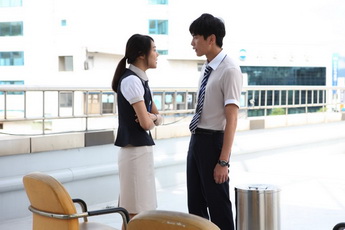 This opening segment is highly entertaining, thanks to punchy dialogue and the vibrant performances of the lead actors. Insults are hurled and retaliations carried out with great energy. But storms don't last forever, and it's when their anger starts to subside that Very Ordinary Couple becomes a more interesting film. Writer-director Roh Deok has said that this is a story not so much about the individual characters of Young and Dong-hee, and the way they develop over time. Rather, it about their relationship itself. The distinction is meaningful, and it accounts for both the way the plot is structured (to say more would be to give too much away), and the manner in which we seem to view the central couple from a slight distance. It's not that we don't care about them. But rather than being inside their heads, we see them always in relation to each other.
This opening segment is highly entertaining, thanks to punchy dialogue and the vibrant performances of the lead actors. Insults are hurled and retaliations carried out with great energy. But storms don't last forever, and it's when their anger starts to subside that Very Ordinary Couple becomes a more interesting film. Writer-director Roh Deok has said that this is a story not so much about the individual characters of Young and Dong-hee, and the way they develop over time. Rather, it about their relationship itself. The distinction is meaningful, and it accounts for both the way the plot is structured (to say more would be to give too much away), and the manner in which we seem to view the central couple from a slight distance. It's not that we don't care about them. But rather than being inside their heads, we see them always in relation to each other.
Model/actress Kim Min-hee (Hellcats, Actresses, Helpless) expresses quite a range of emotions as her character Young gets over the initial breakup and starts to see Dong-hee in a new light. The gradual shifts in her feelings are shown with precision: a further demonstration that as time goes by, Kim's acting skills get better and better. Her co-star Lee Min-gi (Haeundae, Quick) gives off a very different kind of energy -- focused and hot, compared to her cool -- but in this film they complement each other well. He too is an actor with great potential.
Somehow, the setting of the bank also works very well for this story. It not only provides for a range of interesting supporting characters (in particular Ra Mi-ran, who is emerging as one of Korea's leading character actors),but the modern sterility of the bank contrasts well with the heated emotions simmering just below the surface.
It seems inappropriate to call Very Ordinary Couple a romantic comedy, even though it is at times both comedic and romantic. If it is hard to categorize, that may be due to the way the film avoids standard cliches and story arcs about dating and relationships. Instead, we get a highly engaging but also rather honest look at the way feelings both change and stay the same over time. Instead of simply leaving the audience with a warm, romantic buzz, it actually tries to say something about the nature of relationships.
The freshness and originality of this film comes as a pleasant surprise. Young directors in the Korean film industry are often not given very much creative leeway, unless they opt to work on a low-budget production. But Roh Deok was able to navigate the commercial restraints placed on her and still turn out a distinctive, truthful, personal work. Although not a massive hit, it performed respectably well at the box office and drew favorable reviews. Accomplishing all that at once is a notable achievement. (Darcy Paquet)
The last year's horror anthology Horror Stories was well received enough to warrant a sequel. This outing's box office earnings did not measure up to that of its main summer competitor Killer Toon but showed a modest improvement over its predecessor, seen by appx. 490 thousand theatergoers. It shares that awkward air of a model student on deliberately bad behavior with the original but this time the episodes are more streamlined (only three episodes instead of four) and better structured (all have proper endings, even if two of them are pretty predictable). And the third episode is an absolute hoot, depending on your taste and expectations, that is. The film begins with a clever wraparound sequence conceived by our contributor Djuna and directed by Min Kyu-dong (Memento Mori, All About My Wife), set in the "case file" warehouse of an insurance company. A pierced and jewel-studded young insurance agent (Lee Se-young) psychically "reads" each case file at the behest of Chief Park (Park Seong-woong, New World), which then transitions to an episode.
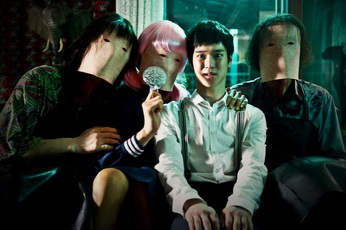 The first episode, "The Cliff," is a psychological horror in a classic Richard Matheson mold involving Dong-wook (Seong Joon, impressive in the recently released Pluto), a fund manager, who gets stranded at a ledge of a cliff with his friend Soo-hyuk (Lee Soo-hyuk, The Boy from Ipanema). Director Kim Sung-ho (Into the Mirror, One Shining Day) brings his crisp, metropolitan sensibility to the minimalist setup, working off on some of his pet themes such as mirroring of identities (Soo-hyuk turns out to have an identical twin brother, for one) and indictment of casino capitalism (a ten-thousand won bill with an S.O.S message written in blood serves as the ironic capper). The second episode, "The Accident," takes a trio of recent college graduates, Ji-eun (Baek Jin-hee, Bandhobi), Seon-joo (Jeong In-seon, Caf? Noir) and Mi-ra (comedienne Kim Seul-gi, famous from her stints for Saturday Night Live Korea), and places them in a creepy country road after a DUI accident wrecks their van. The most conventional episode among the three, "The Accident" does work up a decent amount of suspense and tension despite its utterly predictable denouement. Director Kim Hwi (The Neighbors) displays a good deal of sympathy toward the socio-economic anxiety underlying the consumerist behavior of the just-turned-30 female demographic, but it might have helped if he allowed for more character development. As it stands, the episode is simply too by-the-numbers to be truly effective.
The first episode, "The Cliff," is a psychological horror in a classic Richard Matheson mold involving Dong-wook (Seong Joon, impressive in the recently released Pluto), a fund manager, who gets stranded at a ledge of a cliff with his friend Soo-hyuk (Lee Soo-hyuk, The Boy from Ipanema). Director Kim Sung-ho (Into the Mirror, One Shining Day) brings his crisp, metropolitan sensibility to the minimalist setup, working off on some of his pet themes such as mirroring of identities (Soo-hyuk turns out to have an identical twin brother, for one) and indictment of casino capitalism (a ten-thousand won bill with an S.O.S message written in blood serves as the ironic capper). The second episode, "The Accident," takes a trio of recent college graduates, Ji-eun (Baek Jin-hee, Bandhobi), Seon-joo (Jeong In-seon, Caf? Noir) and Mi-ra (comedienne Kim Seul-gi, famous from her stints for Saturday Night Live Korea), and places them in a creepy country road after a DUI accident wrecks their van. The most conventional episode among the three, "The Accident" does work up a decent amount of suspense and tension despite its utterly predictable denouement. Director Kim Hwi (The Neighbors) displays a good deal of sympathy toward the socio-economic anxiety underlying the consumerist behavior of the just-turned-30 female demographic, but it might have helped if he allowed for more character development. As it stands, the episode is simply too by-the-numbers to be truly effective.
The film's pièce de resistance for my money is the third episode, "The Escape." Director Jung Beom-sik (Epitaph), the helmer of the scary but flawed "Sun and Moon" segment in the original, chucks the conventions of teen-market-catering juvenile horror out the window and comes up with one of the whackiest scenarios in recent memory. A young teacher Ko Byung-shin (Ko Kyung-pyo), a blustering idiot and so scared and stressed of dealing with teenage students as to contemplate a suicide, runs into Sa Tan-hee (the teen-aged beauty Kim Jee-won, who played the kidnapped high school student in the previous film's meandering wraparound sequence), a Goth Lolita who happens to be a practicing black magic priestess. Taking pity on the idiot, she instructs Ko a spell that opens up the portal into an alternative reality, where he will be free from social pressures and need to work for a living. To Ko's initial delight, the spell works... until he takes a closer look at the denizens of the alternative universe. Suffice to say that they make ordinary movie zombies look like JC Penny catalog models.
Illogical, outrageous, unabashedly wallowing in bathroom and oops-you-stepped-on-dog-poop jokes, and drop-dead hilarious, "The Escape" is a delight from start to finish, even though it is obviously not going to be everyone's cup of tea. It is the kind of movie where a character consumes bowlful of writhing, live worms only to puke out geysers of boiled pupae, to the culinary delight of her family members (It is even funnier if you know that the boiled pupae, ppeondegi, used to be a very popular children's snack in South Korea not so long ago). Deeply irreverent to social definitions of "good taste" and chicly indifferent to conventions of a commercial horror film, the episode uncannily feels like it was actually written by a smarty-skirt teenage girl: it captures the kind of insouciant charm and dry wit found in Djuna's stories, wherein the machinations of self-satisfied Korean men, poorly disguised by the rhetoric of social justice or moral righteousness, always implode into their own black holes of idiocy and hypocrisy.
Many will probably prefer the original over Horror Stories 2, and it is perfectly understandable, but my vote is on the sequel. I think it more fully realizes the kind of slightly off-kilter, deceptively intellectual, female-friendly horror that Min Kyu-dong envisioned for the original and did not quite get right first time. It is at the very least a worthy successor and makes me look forward to the third installment with some enthusiasm. (Kyu Hyun Kim)
Yoon-ju (Han Hyo-joo, Masquerade) is a slightly neurotic young cop endowed with the power of 3-D, photographic memory who has applied for the elite surveillance unit of the Seoul metropolitan police supervised by Director Ms. Lee (Jin Kyung, Unbowed). She is taken under the wing by disheveled, bespectacled Chief Detective Hwang (Sol Kyung-gu, Peppermint Candy, Venus and Mars), who immediately nicknames her "Flower Sow:" he keeps custom-made chess pieces of zoo animals-- Squirrel, Snake, Monkey and so on-- representing each member of the team. While stubborn and, well, a big pig-headed, Yoon-ju soon displays a fierce intelligence, physical stamina and excellent sense of judgment to win the admiration and trust of her mentor and colleagues. However, the team meets their match when a tall, mysterious criminal James (Jung Woo-sung, Musa, A Season of Good Rain) pulls off a daring bank heist right under their noses.
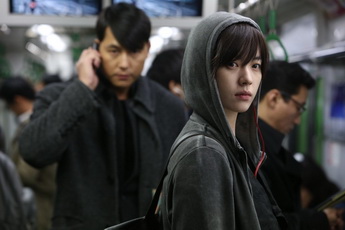 Adapted from the Hong Kong film Eye in the Sky (2007), directed by Johnny To's longtime partner and co-screenwriter Yau Nai-Hoi, Cold Eyes is a pleasantly level-headed thriller keeping things at a cooler-than-room temperature. Like Blind (2011), it is remarkable not primarily because of what it does-- and it does most of what it is supposed to do exceedingly well-- but because of what it doesn't do. There are no tough guys from opposing camps locking their stares in a (homoerotic) figurative embrace. There are no little melodramatic outbursts that try to browbeat viewers into being "touched."
Adapted from the Hong Kong film Eye in the Sky (2007), directed by Johnny To's longtime partner and co-screenwriter Yau Nai-Hoi, Cold Eyes is a pleasantly level-headed thriller keeping things at a cooler-than-room temperature. Like Blind (2011), it is remarkable not primarily because of what it does-- and it does most of what it is supposed to do exceedingly well-- but because of what it doesn't do. There are no tough guys from opposing camps locking their stares in a (homoerotic) figurative embrace. There are no little melodramatic outbursts that try to browbeat viewers into being "touched."
Yes, Yoon-ju breaks down and weeps at one point but it is more out of frustration that she is prevented from bringing the totality of her investigative ability to snare James, rather than out of her being a "caring" female character. As essayed by Han Hyo-joo in a restrained performance, she comes off both sympathetic and convincing as a young professional with believably annoying personal habits and character flaws, but first and foremost defined by her professional skills, rather than her looks or star charisma. Meanwhile, Sol Kyung-gu dials down his Method intensity to allow room for Han and other supporting players to shine. His Detective Hwang is not merely "eccentric" but is a shrewd manipulator of human relations and, as the movie hints, intra-agency political games.
But perhaps the movie's biggest surprise is how it conceives its villain, James. Jung Woo-sung had one of his best recent roles playing against Michelle Yeoh in the clever Chinese wu xia pian/film noir hybrid Reign of Assassins (2010), but it was still a variation on his silently suffering, romantic lead persona, in which he was typecast for some years. Here, Jung plays a master criminal who inscrutably disappears into his "job," and derives perhaps the only joy of his life by observing firsthand how his carefully engineered schemes are realized by the team of marauders he has assembled (In a fascinatingly self-reflexive bit, Detective Hwang at one point quips that James appears to assume the "stance of an omniscient auteur"). Yet, using a fountain pen as the lethal weapon of his choice, Jung also portrays a frighteningly ruthless and focused murderer who means it when he says he prefers to leave no loose ends. His James is a bona fide hard-boiled villain: not the chatty pastiches in a Tarantino film but one found in, say, a Donald Westlake novel (or a tough-as-nails filmic adaptation of it such as The Outfit [1974])
There was little in director-screenwriter Jo Eui-suk's previous film The World of Silence that could have led me to anticipate the assured hand he displays in Cold Eyes, except perhaps for the Dario Argento-like fascination with the fallibility of oracular observation, which is certainly given a nice workout in his screenplay. Given the way Cold Eyes makes most out of the chaotic beauty inherent in the Seoul landscape, with its multiple overhead shots of glass-and-concrete skyscrapers and frighteningly ubiquitous CCTV footage, it seems likely that DP and co-director Kim Byung-seo's (DP of The Aggressives and Hur Jin-ho's Dangerous Liaisons [2012] among many others) contribution was substantial.
It is ironical that the least sentimental, the least macho-cool-guy-enamored, the most hardboiled and smart (I haven't even gotten into the film's fascinating political stance: sort of Fritz Lang by way of Derek Flint and Man from U.N.C.L.E) Korean thriller I have seen in years is an adaptation of a Hong Kong film, but of course by mid-2000s the HK film industry had already evolved beyond their old "Hong Kong noir" model. Those who miss Chow Yun-Fat fixing you with a sexy stare while flying through the air blasting two pistols in John-Woo-trademarked slow motion may find Cold Eyes, well, more than a little cold. It is otherwise highly recommended to others, especially young female viewers who have previously been turned off by lack of identifiable heroines in crime thrillers of this type: I assure you, this baby is different. (Kyu Hyun Kim)
A former news anchor Yoon Young-hwa (Ha Jung-woo, The Berlin File), demoted due to a personal scandal, now runs a daytime talk radio show. Deeply unhappy and divorced from his TV journalist wife (Kim So-jin), Yoon contemptuously tells off a particularly onerous caller (David Lee, Pluto) who then calls back to announce that he will blow up a section of the Mapo Bridge over the Han River. When the bridge actually explodes, and the terrorist promises to call again, Yoon is inspired to go "live" with an interview with him, making a hard deal with his superior (Lee Kyeong-yeong, Hwayi: A Monster Boy) to have him reinstated if the "live program" leads to the angry culprit's on-air confession and arrest. However, he soon finds out to his terror that the "crazy caller" has always been several steps ahead of him.
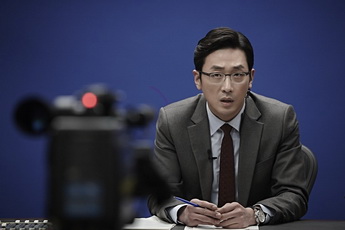 The Terror Live opened domestically in July 2013 to a stiff competition against Pacific Rim, Man of Steel and other Hollywood summer blockbusters but managed to best them all, selling a very respectable figure of 5.58 million tickets nationwide, ranking as the ninth biggest box office hit of the year, just behind Hide and Seek and The Attorney.
The Terror Live opened domestically in July 2013 to a stiff competition against Pacific Rim, Man of Steel and other Hollywood summer blockbusters but managed to best them all, selling a very respectable figure of 5.58 million tickets nationwide, ranking as the ninth biggest box office hit of the year, just behind Hide and Seek and The Attorney.
Once we decide not to question the wild implausibility of its terrorist's near-omnipresent power, the film works rather well, sometimes beautifully. Writer-director Kim Byung-woo wisely confines the setting to one recording studio, later turned into a makeshift war room for the broadcasting company, and keeps Ha Jung-woo front and center for most of the movie's screen time. Ha rises to the challenge by essaying a complex character with believably self-contradictory traits, at once arrogant, ruthless and compassionate. It is also encouraging to see a Korean film so good at calmly manipulating its viewers to generate maximum suspense, rather than subjecting them to mock-cathartic (as opposed to genuinely emotionally satisfactory) explosions of undeserving sentiments. The cunning, reptilian efficacy of Kim's direction, especially in the first half, is its greatest asset.
Indeed, The Terror Live, like Cold Eyes, perhaps 2013's most underappreciated Korean film, hints at a new orientation in Korean genre cinema, an increasing emphasis given to adult professionals devoted to doing their jobs: such attention to the character's professionalism allows the movie to "get right" the kind of details that appear miserably or laughably fake in most other Korean genre efforts, such as an entirely credible female government agent (played with impressive level-headedness by Jeon Hye-jin, All For Love) and a brisk yet loaded exchange between Yoon and his ex-wife that never once breaks out from the mold of two journalists reporting on a potentially life-threatening situation.
Alas, The Terror Live in the second half begins to turn toward a depressingly familiar direction that uses its large-scale spectacles to crudely declare its hate of the Establishment, here represented by President (so obviously based on the ex-President Lee Myung-bak) and his law-and-order cronies. By the time the terrorist shows his true colors, the film has begun to waves its "The Terrorist Had His Reasons for Hating the Government" message as if it is a shocking revelation to the viewers. Moreover, the terrorist himself turns out to be such a whiny, hypocritical worm (through no fault of the talented young actor David Lee, saddled, by the way, with an almost identical role in Pluto) that you not only don't believe for one microsecond that he could have organized such a grand and complicated scheme all by himself, rigging dozens of bombs all throughout Seoul, but also don't feel one angstrom of "subversive" sympathy toward him. Frankly, Joker in The Dark Knight when he conducted a lethal social experiment with the Gothamites in two ferryboats (a sequence that obviously inspired much of The Terror Live) made a whole lot more sense.
In the end, director-writer Kim ends the film on a deflatingly but understandably nihilistic note, perhaps well aware that the dreadful (male) melodrama that intrudes into the film's climax cannot substitute for a real call for political action. Now that he proved that he is a filmmaker to be reckoned with, I hope for his next project he drop the typically Korean ink-sucker's hubris and just concentrate on making a great genre thriller.
Technically, the film visually makes an efficient use out of broadcasting cameras, cell phone and other found footages but is most impressive in terms of its deceptively complex editing (supervised by Kim Chang-joo, The Face Reader, Snowpiercer) and sound design (headed by Jeong Jin-wook, Yellow Sea). The spectacles of the final explosions on CGI, on the other hand, are not altogether convincing. All in all, The Terror Live is worth your time as an ingenious, taut thriller and as a snap-shot commentary on the left-wing annoyance at the conservative turn of Korean government in the last decade and a half. Of course, this expression of annoyance leads to nowhere fast, much less to any practical solution, but it is still captured here for what it's worth. (Kyu Hyun Kim)
The Korean title, gwansang (Chinese pronunciation guanxiang), of this very entertaining but flawed period piece (sageuk) refers to a form of divination or fortunetelling that supposedly allows one to figure out a person's personality, proclivities and destiny from his or her facial features: a grab-bag version of metoposcopy or phrenology, if you will. Following at the heels of another smash-hit period piece Masquerade, The Face Reader, penned by Kim Dong-hyuk, reunites the busy star Song Kang-ho (Snowpiercer) with the The Show Must Go On director Han Jae-rim. Even though its story is a downer, given that the movie is ultimately about the powerlessness of a good person against the larger forces of history, it still proved a great hit in time for the 2013 Chuseok season, raking in more than seven million tickets in two weeks.
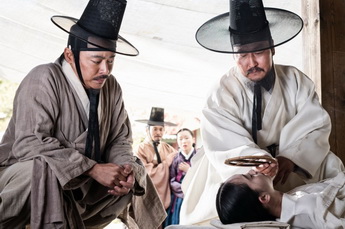 Like Masquerade, The Face Reader is an upgraded version of the sageuk that presumably have incorporated the know-how accumulated from the recent TV successes of similar genre efforts. Under the sure hand of director Han, the film deftly combines the high gloss of court pageantry, sophisticated melodramatics, clever dialogues and the requisite projection of contemporary Korean obsessions to the distant past. The film's protagonist, Nae-gyung, brought to life by Song Kang-ho's reliably (yet no less impressively) skilled performance, is a failed yangban academic whose family had been persecuted for standing at the wrong side of the political fence. As the film opens, he is recruited by a high-class Seoul courtesan Hong-ryun (Kim Hye-soo, The Thieves) to service her bigwig clientele. At first content at being a witty raconteur, he gradually wins over the trust of important men such as the reigning king's adviser Kim Jong-seo (Baek Yoon-shik, The Taste of Money) and eventually the king himself, and renews ties with his estranged son Jin-hyung (Lee Jong-suk, R2B: Return to Base) who has become a low-rank court official under a fake identity. To his ultimate heartbreak, though, his increasingly significant role in the eyes of the power-holders gets him embroiled in the Joseon dynasty's first major succession crisis, that ended tragically with Prince Su-yang (Lee Jeong-jae, New World) expelling his fifteen-year-old nephew from the throne and assuming the title of King Se-jo in 1455.
Like Masquerade, The Face Reader is an upgraded version of the sageuk that presumably have incorporated the know-how accumulated from the recent TV successes of similar genre efforts. Under the sure hand of director Han, the film deftly combines the high gloss of court pageantry, sophisticated melodramatics, clever dialogues and the requisite projection of contemporary Korean obsessions to the distant past. The film's protagonist, Nae-gyung, brought to life by Song Kang-ho's reliably (yet no less impressively) skilled performance, is a failed yangban academic whose family had been persecuted for standing at the wrong side of the political fence. As the film opens, he is recruited by a high-class Seoul courtesan Hong-ryun (Kim Hye-soo, The Thieves) to service her bigwig clientele. At first content at being a witty raconteur, he gradually wins over the trust of important men such as the reigning king's adviser Kim Jong-seo (Baek Yoon-shik, The Taste of Money) and eventually the king himself, and renews ties with his estranged son Jin-hyung (Lee Jong-suk, R2B: Return to Base) who has become a low-rank court official under a fake identity. To his ultimate heartbreak, though, his increasingly significant role in the eyes of the power-holders gets him embroiled in the Joseon dynasty's first major succession crisis, that ended tragically with Prince Su-yang (Lee Jeong-jae, New World) expelling his fifteen-year-old nephew from the throne and assuming the title of King Se-jo in 1455.
The Face Reader evinces little of the acerbic touches and skewed perspective that director Han used to deconstruct romantic expectations and "family values" in his previous films, but that does not mean that it is a soulless corporate product. Aided by DP Go Rak-seon's (Nameless Gangster) evocative cinematography and production designer Lee Ha-joon's (The Housemaid) robust yet believably aged backdrop, Han paints a complex narrative of Nae-gyung's ascendancy with an appropriate level of clarity and, as occasions demand them, bold, colorful strokes, with geysers of blood spouting in slow motion and characters wailing in agony.
In this task he is lucky to have this group of talented actors under his command. Aside from Song's non-flashy but brilliant lead performance, Kim Hye-soo is as delectably sexy as she has ever been, and Baek Yun-shik replaces an air of vainglorious self-consciousness that his supporting characters usually carry with them with stalwart, medieval-knight gravitas. More problematic is Lee Jeong-jae's Prince Su-yang, the characterization of which illustrates the strengths and weaknesses of The Face Reader. On the one hand, it is great to see Prince Su-yang portrayed as a sort of nomadic barbarian, decked in dark animal fur and hunting tigers with his band of battle-scarred underlings, an image completely unlike the portrayals in old ('70s and '80s) period pieces, but possibly more historically accurate (He is said to have shot seven arrows at a running deer during a hunt and each one of them penetrated the unlucky deer's neck. This he did when he was thirteen). On the other hand, Lee is directed to play him more or less as a cruel bastard, without much shading of character, obviously to call into viewer's mind the contemporary evil (such as the twentieth-century military dictators) they are familiar with. This ideologically unimaginative characterization and the lugubrious tone that dominates the film's second half contrasts with the Mentalist-like prowess of facial reading Nae-kyung displays in the first half, poignant and entertaining in equal measure (I must give credit to the screenwriter Kim and director Han for not turning Nae-gyung's "special ability" into something psychic or supernatural. That would have fairly ruined the entire enterprise).
Given the film's premise, one of the chief pleasures of The Face Reader is an abundance of supporting players with "interesting faces," reminding us once again just how much recent Korean blockbusters owe their successes to a hardworking group of almost-anonymous actors: Jeong Gyu-su (Moss) as a sharp-tongued brothel manager, Jo Jeong-seok (Architecture 101) who does quite well with a potentially thankless role of Nae-gyung's sidekick, Kim Eui-sung (National Security) as the shadowy conspirator Han Myeong-hoe, and so on.
Not as intriguing as War of the Arrows and not as crowd-pleasing as Masquerade, you could still do a lot worse than The Face Reader in making a Joseon-dynasty-set period piece. I wish it could have done more with the psychologically astute exploration of the Korean mindset revealed in Nae-gyung's interaction with various characters, without turning into yet another grandiloquently tragic, politically resentful "spectacle" in the latter half, but overall I must say it deserves its box office success.
Oh, and I am muy contento that director Han abandoned his headache-inducing shaky-shaky cam for this film. I had been seriously worried that that was the only way he could make a movie. (Kyu Hyun Kim)
You can see the forest from the trees in Hong Sangsoo's Our Sunhi. Hong's panning to the tops of trees as transitions from the wider forest of scenes is quite delightful. He has centered on things like landmarks in the past (Tale of Cinema and Nobody's Daughter Haewon), but these tree tops make me curious. Perhaps it's a further emphasis on the seasons in Hong's work. His characters feel the biting cold of winter, the saturating heat of summer, the blustery wind of fall, the pestering rain of spring. The tree tops might be, as the character Professor Choi Dong-hyun (Kim Sang-joong, The Day He Arrives) says, Hong's way of 'Enjoying a taste of autumn', along with the fall-leaf-colored sartorial choices for his characters.
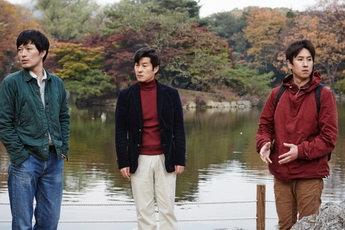 Or perhaps I should consider Purdue University professor Marshall Deutelbaum's emphasis on Hong's experimental approach in an effort to make sense of these trees. Deutelbaum delivered a paper for a panel on Hong's work at the 2014 Society for Cinema and Media Studies conference where he argues against a tendency to associate Hong with other filmmakers. Entitled "The Non-analogous Hong Sang-soo: Seeing His Films on His Own Terms"(*), Deutelbaum's paper argues against trying to make sense of Hong's films through our sense of other directors, be they other Asian directors (Tsai Ming-liang or Hou Hsiao-hsen) or not (Michelangelo Antonioni or Eric Rohmer). Our need to connect directors across thematic, regional, or stylistic arcs might cause us to see things that aren't there in Hong's work, or keep us from noticing what is indeed there. This need to analogize his work with that of others has caused many of us to downplay the experimental intent in Hong's films. Deutelbaum's encouragement to see something other than what others put there helps me to contemplate the trees differently. I can consider how Professor Choi looks up at the sun between the leaves as we the audience did a few minutes ago, Professor Choi realizing a different bench would be warmer, without needing an immediate answer for this unusual transition choice. I then find myself reflecting on the title card transitions Hong placed in Turning Gate, where Hong wanted the audience to know what was going to happen before the scene began in order to focus the audience's attention on the how of the scene. At least in this tree top transition just described, it could be a means of putting us in the place of Professor Choi', showing us what he will see before he sees it.
Or perhaps I should consider Purdue University professor Marshall Deutelbaum's emphasis on Hong's experimental approach in an effort to make sense of these trees. Deutelbaum delivered a paper for a panel on Hong's work at the 2014 Society for Cinema and Media Studies conference where he argues against a tendency to associate Hong with other filmmakers. Entitled "The Non-analogous Hong Sang-soo: Seeing His Films on His Own Terms"(*), Deutelbaum's paper argues against trying to make sense of Hong's films through our sense of other directors, be they other Asian directors (Tsai Ming-liang or Hou Hsiao-hsen) or not (Michelangelo Antonioni or Eric Rohmer). Our need to connect directors across thematic, regional, or stylistic arcs might cause us to see things that aren't there in Hong's work, or keep us from noticing what is indeed there. This need to analogize his work with that of others has caused many of us to downplay the experimental intent in Hong's films. Deutelbaum's encouragement to see something other than what others put there helps me to contemplate the trees differently. I can consider how Professor Choi looks up at the sun between the leaves as we the audience did a few minutes ago, Professor Choi realizing a different bench would be warmer, without needing an immediate answer for this unusual transition choice. I then find myself reflecting on the title card transitions Hong placed in Turning Gate, where Hong wanted the audience to know what was going to happen before the scene began in order to focus the audience's attention on the how of the scene. At least in this tree top transition just described, it could be a means of putting us in the place of Professor Choi', showing us what he will see before he sees it.
"The Evolution of Hong Sang-soo" panel was chaired by Marc Raymond of Kwangwoon University in Seoul. Raymond's own paper was "Static Shots, Changing Perspectives: The Group Table Shot in Two Films by Hong Sang-soo" in which he looks at how the obligatory table shots in Hong's films may have been a consistent repetition, but have not been as consistently shot as some might presume. In fact, in Our Sunhi one tabling comes at over 9 minutes long, the longest table shot take ever taken by Hong. This underscores how Hong's situations might repeat, but there are also nuanced aspects to every Hong déjà vu. As the panel title proposes, Hong's films have evolved.
This is where my paper for the panel comes in, "Watching the Male Gaze of Hong Sang-soo's Characters". The argument in my paper about how Hong's efforts to show the male gaze without participating in the male gaze in key scenes in Turning Gate and Woman Is the Future of Man provides evidence for the seeds being planted for Hong's move towards focusing on women characters. And just as Deutelbaum and Raymond's papers prove fruitful frames for Our Sunhi, I was happy to see my argument further supported by the three male characters getting lost in their gaze as they searched for their imagined Sunhi. She refuses to be controlled by this gaze, even intervening to have Professor Choi re-write his textual gaze of her. If this woman is the future of Hong's men, it's a future of Sisyphean progressions amid regressions.
It's interesting to consider how in these Hong films that focus on women, (In Another Country, Nobody's Daughter Haewon, and Our Sunhi), these women are positioned to leave South Korea. At least two of the Annes are set to return to France, Haewon is bound for America in her dreams if not to follow her mother to Canada, and Sunhi is trying to get the reference letter that will help her study in America. In fact, much is made of how Sunhi has disappeared from these men once already even if she's stayed in South Korea during that disappearance. Intriguingly, these men aren't angry at Sunhi about this. The male anger in this film is levied by Jaehak (Jeong Jae-young, Moss, GLove) in his strong words for his junior Munsu (Lee Seon-gyun, Oki's Movie, Nobody's Daughter Haewon) to not hold women back. Jaehak's spoken reference letter for Munsu is summed up by his comment, "Knowing what you can't do . . . that's how you know who you are."
Upon my second viewing in preparation for its screening at the 57th San Francisco International Film Festival, I found that my understanding of Our Sunhi as a women-focused film needed to be modified slightly. Although actress Jung Yu-mi (Like You Know It All, Oki's Movie, In Another Country) is given plenty of screen time to demonstrate the worthiness of her Best Actress nomination for the inaugural Wildflower Awards, the men take up a lot of the film because there are three of them and they each are presenting their take on our Sunhi. Thankfully, there is enough time provided for Sunhi self-definition as the men roam around Korean history looking for traces of a Sunhi that she herself refuses to fully take on.
* Hong Sangsoo told me once he prefers his given name be spelled without the dash. However, common practice in romanizing South Korean names into English is to place a dash between two syllable given names. When I have liberty to de-dash, I do. Many scholarly publications maintain the dash, hence why all the references to his given name in the papers above have the dash. This accounts for the inconsistency of Sangsoo/Sang-soo above. (Adam Hartzell)
Shin Yeon-sik's (who previously directed an indie feature A Great Actor) Russian Novel consists of two stories separated by 27 years of time gap. Even though same characters appear in these two stories, they come across as two conjoined, independent films, as their styles are radically different and their characters are portrayed by different actors.
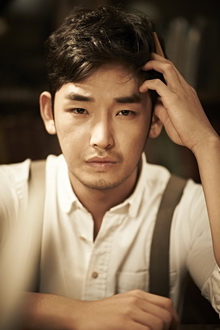 Part 1, if I may call it so, is the story of an aspiring writer (Kang Shin-hyo, the actor's name is identical to the character's), vaguely set in mid-'80s or at least when a computer was not yet such a ubiquitous tool for writing (The film never bothers to clearly address the story's historical background, which would have helped). Shin-hyo lacks college education and is not much of a reader, but is determined to be a successful writer after falling in love with the novels of Kim Ki-jin, one of the country's most celebrated novelists. He does have a lot of stories to tell but, having never been trained in the basics of storytelling, does not know where to begin.
Part 1, if I may call it so, is the story of an aspiring writer (Kang Shin-hyo, the actor's name is identical to the character's), vaguely set in mid-'80s or at least when a computer was not yet such a ubiquitous tool for writing (The film never bothers to clearly address the story's historical background, which would have helped). Shin-hyo lacks college education and is not much of a reader, but is determined to be a successful writer after falling in love with the novels of Kim Ki-jin, one of the country's most celebrated novelists. He does have a lot of stories to tell but, having never been trained in the basics of storytelling, does not know where to begin.
Shin-hyo is a fairly interesting character, a combustible mixture of an artist's mental arrogance and the hoi polloi's lack of confidence. His antics are funny observed from a distance but he is frankly not a person you would want to keep around as a friend. Through Shin-hyo's misadventures in a literary salon run by Kim Ki-jin, we encounter a variety of supporting characters: Seong-hwan (Kyung Seong-hwan), Kim's son, carries a chip on his shoulder about his famous daddy: Jae-hye (Lee Jae-hye) is a bright college girl seemingly sold on Shin-hyo's literary talents: and Kyung-mi (Lee Kyung-mi) has become a successful novelist out of her factory-worker background.
Their individual stories are directly conveyed or indirectly transmitted through the novels they are writing. The manner in which this is done may be called a text-centered approach; for instance, large subtitles aggressively move across the screen whenever a character reads sentences from his or her work. This deliberate clash between literature and cinema and the resulting fusion and hybridization of these two media are presented in a rather attractive manner.
Part 1 of the movie ends with Shin-hyo falling into a vegetative state due to drug overdose. Part 2 picks up the story thread as he wakes up from the 27-year-lasting coma, and throws a puzzle to be solved at the audience. Shin-hyo finds that he had become a bestselling author, to the initial rocket-boosting of his ego. However, he realizes that someone had substantially revised most of his manuscripts. Who would have done such a thing? This whodunit becomes the main narrative drive of Part 2.
Which is too bad, as Part 2 is clumsier and less believable than Part 1 in almost every way. The biggest problem is Shin-hyo's character. Consider: if you were a young writer who had never stepped on the threshold of a publishing company's door, and informed upon your awakening from a long coma that you were now a bestselling author, what would you do? Don't you think the first thing you would want to do is get a copy of your own novel and check it out? But the older Shin-hyo never bothers to do this, even when he is touring the country giving lectures on his own books! This simply stretches the credibility to the point it snaps.
True, Kim In-soo, in the role of the older version of Shin-hyo, gives a seasoned performance but we never really believe that this is the same crass young writer we saw in Part 1 after twenty-seven years of zero human interaction. He appears as a normally aged professional quite used to being accorded respect and recognition by the younger generation for some time.
Neither are other characters as interesting in Part 2. Many of them seem to have lost the qualities that made them charming and alert in Part 1, which may well have been the point of the movie. Still, this does not change the fact that they are less interesting.
Finally, the "whodunit" puzzle itself is ultimately meaningless. The way the movie resolves itself, "who" revised Shin-hyo's originals turns out to be not such an important question after all. Little in the story is affected by substituting one character with another in the position of the culprit. Besides, as any professional writer can tell you, publication of a book does not really end with a writer "finishing" her manuscript. Proofreading, editing and all the other physical processes of publication cannot be abstractized away from the "writing a novel" the way screenwriter-director Shin is trying to do here. No dice, pal.
My advice would have been to delete the half-baked mystery angle and bring a tighter focus to the relationship between the writer and the editor. As it exists, the end result is a near-miss: given the not-inconsiderable pleasures of Part 1, The Russian Novel could have been a much more powerful cinematic experience. (Djuna, translated by Kyu Hyun Kim)
Hwayi (Yeo Jin-goo) is a cute, shy teenager with an unusual background: he has been raised by five men, each of whom he calls "Dad,"-who happen to be a murderous gang of criminals: Jin-seong (the frequent Song Il-gon collaborator Jang Hyun-sung), a lawyer and the brain of the outfit, Dong-bum (Kim Sung-kyun, The Suspect), a jackal-like, knife-wielding point-man, Ki-tae (Cho Jin-woong, Perfect Number), a stuttering "nice guy" driver, Beom-soo (Park Hae-joon, Helpless), a sniper cum "cracker," and the charismatic Seok-tae (Kim Yun-seok, The Thieves), the gang's leader. Oh yes, there is also a "Mom," Young-joo (Im Ji-eun), literally chained to the walls of their "home" and treated like a very stupid dog by Seok-tae. "Dads" have thoughtfully trained the boy in various skills of criminal trade, including an art of long-distance high-precision shooting (no mere street punks, these guys). Given his home environment, it comes as no surprise that Hwayi occasionally has bouts of hallucination, during which he is menaced by a snarling, betentacled monster who either wants to enter his body or eat him alive. His "normal" life begins to unravel, when the gang takes the job of killing off an old couple refusing to sell their property to make way for a big construction project, and Seok-tae for some reason insists on taking the boy along.
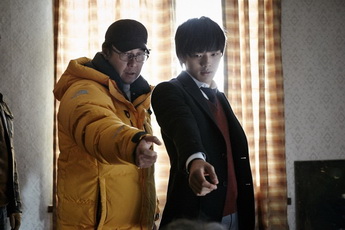 Hwayi generated a tremendous level of anticipation among the fans of New Korean cinema, due to the fact that it marked the return of Jang Joon-hwan, the man behind Save the Green Earth (2003), an utterly unique and dazzling amalgam of Tim Burton-like whimsy, satirical SF, teeth-rattling horror and sentimental melodrama. Despite its cult reputation the film was classified as a box office failure and Jang has been bereft of a chance to direct another feature film (A sequel to Tazza: The High Rollers was one of the numerous projects his name was briefly attached to) for close to ten years, driving his loyal fans up the wall. Thankfully, Hwayi, while not a monster hit in the range of The Berlin File or Secretly, Greatly, was a modest success, recouping its upper-middle level production cost with approximately 2.4 million tickets sold nationwide, despite being stuck with an adult-only rating due to its hyper-cranked-up violence (amputation by a sniper rifle, a hospital patient viciously stabbed to death, etc.).
Hwayi generated a tremendous level of anticipation among the fans of New Korean cinema, due to the fact that it marked the return of Jang Joon-hwan, the man behind Save the Green Earth (2003), an utterly unique and dazzling amalgam of Tim Burton-like whimsy, satirical SF, teeth-rattling horror and sentimental melodrama. Despite its cult reputation the film was classified as a box office failure and Jang has been bereft of a chance to direct another feature film (A sequel to Tazza: The High Rollers was one of the numerous projects his name was briefly attached to) for close to ten years, driving his loyal fans up the wall. Thankfully, Hwayi, while not a monster hit in the range of The Berlin File or Secretly, Greatly, was a modest success, recouping its upper-middle level production cost with approximately 2.4 million tickets sold nationwide, despite being stuck with an adult-only rating due to its hyper-cranked-up violence (amputation by a sniper rifle, a hospital patient viciously stabbed to death, etc.).
So, was Hwayi able to meet the high anticipation of this Jang Jun-hwan fan expecting another sui generis masterpiece? The short answer is no. Based on a screenplay by Park Joo-suk, the film is wildly uneven: it feels simultaneously extreme and subdued, honestly sentimental and slickly manipulative, beautifully held together at one moment and embarrassingly coming apart at another. The fact that Jang was not able to maintain a consistent tone throughout his film- which he miraculously achieved in his previous effort, despite the concatenation of thoroughly incompatible genre elements- becomes obvious long before the deus ex machine of a competing group of villains enter the picture in the second half.
Granted, the main problem from my perspective seems to be Park's screenplay. It takes a rather extreme premise (a young boy trained to be a master criminal by five father figures), a sort of fanciful, "dark" superhero origin story, and overcooks it with a lot of socio-political agendas thrown in. The screenplay's Big Theme is a critique of patriarchy: indictment of how Korean Fathers are screwing up their Sons. Yet the manner in which this theme is articulated remains vituperatively masculine, leaving no room for any meaningful female intervention (except for by those "mothers" who are literally human punching bags or helpless victims of the invading males from outside the "home").
More alarmingly, there is little subtlety or nuance to the characters. I do see that director Jang tries hard to add shadings and colorings to them, along with the talented cast. He orchestrates the faux domesticity of Hwayi's "family" rather convincingly: he also directs the scenes in which Seok-tae forces the boy to kill the elderly minister (Lee Geong-yeong, The Berlin File) and other tense confrontations with consummate skill, heightening emotional tension and drawing in the viewers. However, other sequences involving the melodramatic "revelations" mostly fall flat, not because Jang does not know how to wrangle them, but because the characters are disappointingly superficial.
For this reason, I was not as impressed as some Korean critics were by the crucial performance set pieces that revolve around Seok-tae's character and his cruel maneuver to spiritually corrupt Hwayi. While Kim Yun-seok is suitably restrained in these scenes as the ultimate object of Oedipal rage, he does not really turn into a quasi-Shakespearean tragic figure, as presumably intended by Jang, but remains a psychopath with severe daddy issues. Neither does Hwayi, no matter how much Yeo Jin-goo cries onscreen (and he does weep seemingly a few buckets of tears), become a flesh-and-blood teenager. His relationships with other characters are defined by plot mechanics rather than real, lived-in sense of attachment or antagonism. Consequently, the evolution of Hwayi into a kind of dark superhero (complete with his command of extra-legal power to kill the "true villains" of the society) fails to generate a genuine emotional catharsis on the part of the viewers: it instead ends up feeling like a particularly smug and pro-vigilante denouement of an American graphic novel from the Reagan-Bush era. Some characters, such as Detective Kim (Choi Jeong-min, Address Unknown), the gang's cop nemesis, and Yoo-gyung (Nam Ji-hyun), Hwayi's "girlfriend," are entirely defined by their expository and generic functions and range from mildly annoying to completely useless.
All this is not to say Hwayi is a worthless or even a badly made film. The level of filmmaking skills and technical expertise in evidence is very high: DP Kim Ji-yong (The Last Stand) and Lighting Supervisor Cho Kyu-young, Production Designer Chae Kyoung-seon (Detective K) and the art direction team, martial arts director Jung Doo-hong (The Berlin File) and other staff members collaborate under Jang's guidance to bring vivid colors and exciting action to the briskly moving tale. And there is something to be said in favor of Jang Jun-hwan's approach that does not scare away from full-throttle revving-up of the emotional engine. No doubt that some viewers will be able to resonate with the volcanic struggles between the eponymous character and his ersatz fathers, without feeling like being steamrolled over by their unruly excesses or short-changed by their artifice. Too bad I was not one of these viewers.
I came to Hwayi wanting to really like it, and indeed there are sporadic moments in the film that remind me of a great motion picture it could have been. In the end, though, I must classify it under the file heading Interesting Misfires. Hwayi neither allows Jang Jun-hwan to freely explore the terrains of his untamed imagination (could any Korean producer have allowed it, under today's cutthroat climate?), nor does it commit itself to its synthetic premise and let us have a pleasant diversion based on that. The thin characterizations cannot really withstand and ultimately collapse under the weight of its Big Theme as well as its fashionably dour, pissed-off-at-the-world core narrative. (Kyu Hyun Kim)
In her previous documentary, Talking Architect (2011), director Jeong Jae-eun chronicled the last two years in the outspoken architect Chung Guyon's (read "Ghee-yong," in the French-style pronunciation) life. The first Korean-language documentary to explicitly address the architectures of Seoul and other urban areas, it was both a great human-interest story and an intellectually stimulating, visually breathtaking mediation on the interaction between Seoul residents and their physical environment. However, Talking Architect was an offshoot project from director Jeong's original intent: to make a documentary on the new Seoul City Hall. Now she returns to the theaters worldwide with that very documentary in her hands. While perhaps not as heart-warming as her previous work, City: Hall nonetheless reaches into our minds and stimulates our sense like no other Korean film has done, documentary or not. Most importantly, this highly original work of art captures the evolving outlook of the sprawling megacity in its majestic resplendence and audacious hybridity.
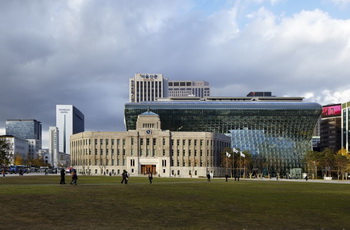 In City: Hall, Jeong, responsible for the coming-of-age masterpiece Take Care of My Cat (2001) and the fascinating urban youth film The Aggressives (2005), takes on the eponymous edifice, under construction since May 2008 and finally finished in September 2012. It turned out to be one of the most controversial buildings ever erected in the city that has withstood countless acts of destruction and reconstruction, by an arrogant colonial power, and later by a devastating global war and several military dictatorships hell-bent on splashing the markers of compressed modernity on its face. The new city hall, designed by renowned architect Yoo Kerl, became controversial not in the least because its appearance was shockingly futuristic, especially in contrast with the old city hall built in the colonial period, now to be preserved as the metropolitan library. My own impression upon seeing the former under construction for the first time was something in the line of a "glass-eyed Cyclops reclining on a space-alien's gargantuan metal cot, lazily letting Ulysses' crew crawl all over its massive body."
In City: Hall, Jeong, responsible for the coming-of-age masterpiece Take Care of My Cat (2001) and the fascinating urban youth film The Aggressives (2005), takes on the eponymous edifice, under construction since May 2008 and finally finished in September 2012. It turned out to be one of the most controversial buildings ever erected in the city that has withstood countless acts of destruction and reconstruction, by an arrogant colonial power, and later by a devastating global war and several military dictatorships hell-bent on splashing the markers of compressed modernity on its face. The new city hall, designed by renowned architect Yoo Kerl, became controversial not in the least because its appearance was shockingly futuristic, especially in contrast with the old city hall built in the colonial period, now to be preserved as the metropolitan library. My own impression upon seeing the former under construction for the first time was something in the line of a "glass-eyed Cyclops reclining on a space-alien's gargantuan metal cot, lazily letting Ulysses' crew crawl all over its massive body."
Jeong's documentary delves deeply into various features of the controversy surrounding this new city hall. The selection process for the design went through several acute crises, the Cultural Heritage Administration turning down design submissions six times. Once Yoo's proposal had been accepted, the construction was plagued by clashes between the architectural firm, representing Yoo's artistic intent, and Samsung C&T, representing the standards of efficiency and deadline. And of course, there was the Seoul citizen's reaction, ranging from bemused confusion to alarm to vociferous antipathy, to the outrageously futuristic design as well as the whole process of construction. All these reactions became fodders for political criticism against Mayors Lee Myung Bak (2002-2006, later President of Korea) and O Se-hoon (2007-2011).
Jeong, however, deftly maneuvers around this nightmare tangle of politically charged debates to zero in on the aesthetic intent, the philosophy, if you will, behind the conceptions of the new city hall. She shows the abandoned initial design (called by detractors "a broken vase city hall") as well as competing designs submitted by other notable architects, along with their impressively articulate explanations of their handiworks, letting the viewer decide on his or her own the soundness of the blue-ribbon panel's decision. Jeong maintains an admirably balanced perspective through it all. The film reaches its emotional climax in about two-thirds point when Yoo Kerl and his team of architects square off against the Samsung C&T representatives: voices are raised, tears of frustration are shed. Yet, the director refuses to portray either side as villains: they are all professionals who know what they are doing, caught up in the ruthless, pulverizing mechanism of a megalithic, public construction project, hoping against hope to have everything finished on time, and to bring at least some level of satisfaction to everyone involved. She allows the viewer to share the frustration and joy of seeing a larger-than-life, man-made object incrementally come into a concrete existence.
Interspersed with this fascinating story of how a controversial blueprint is turned into a controversial building are crisply lensed, alternately peaceful and gorgeous views of the city hall itself and its surrounding environments, along with portrayals of Seoul residents casually relaxing in the public square, enthusiastically participating in festivities and concerts, and occasionally throwing curiosity-filled glances up at the emerging edifice. City: Hall, without ever being self-consciously dramatic or polemical, ultimately demonstrates that Seoul is more than sum of its parts, and reassures the viewer that the city is magnanimous enough to accept the radicalness of its new landmark.
By the end of the film, it becomes clear that, despite its cool, clear-eyed viewpoint, City: Hall is a documentary with passion in its heart. The film is, more than anything else, a declaration of love for Seoul, the unruly, complex and yet unimaginably beautiful metropolis. More than its technical brilliance, balanced perspective and intellectual heft, it is this love that shines through this must-watch documentary.
* This review has been adapted from an English-language introduction written on behalf of director Jeong Jae-eun earlier this year. (Kyu Hyun Kim)
Da-eun (Son Ye-jin, The Pirates, Open City), a college student and aspiring journalist, lives with her doting single dad, Jeong Soon-man (Kim Kap-soo, A Tale of Two Sisters, KT). She becomes intrigued by an old kidnapping-murder case the statute of limitations of which is about to expire shortly. The only clue about the culprit is a recording of his voice demanding the ransom. The mpg file of the voice recording has been made widely available in the last desperate attempt by the police and the father of the dead child, Dr. Han (Kang Sin-il, The Black House). Da-eun casually listens to one of the recordings replayed in a TV program, and to her horror realizes that she recognizes the kidnapper's mocking voiceˇ¦ it belongs to her kind, unassuming father.
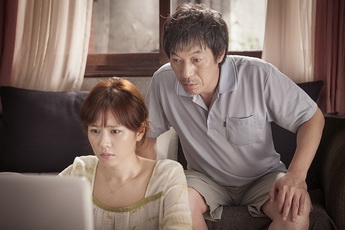 Blood and Ties, the Korean title of which is An Accomplice, comes with an interesting backstory. It is written and directed by Kook Dong-seok, who had served as Assistant Director for Park Jin-pyo's Voice of a Murderer (2006), a grueling docu-drama based on a real-life kidnapping and murder case from 1991. Park's film was an earnest effort to use the medium of cinema to make a difference in real life (some might say in a wrong-headed way), and ended with the replay of an actual recording of the kidnapper's voice (A double-fictionalized version of the movie, The Whisper of the Devil, is watched and commented on by Da-eun and her friends). For the record, the statute of limitations in Korea for cases such as these is fifteen years, thus, despite the efforts of director Park (Too Young to Die, You Are My Sunshine) the time had already run out by the time Voice was released in theaters. We are told that Park was initially not happy about making an unofficial "sequel" to Voice, but was soon roped in as its producer.
Blood and Ties, the Korean title of which is An Accomplice, comes with an interesting backstory. It is written and directed by Kook Dong-seok, who had served as Assistant Director for Park Jin-pyo's Voice of a Murderer (2006), a grueling docu-drama based on a real-life kidnapping and murder case from 1991. Park's film was an earnest effort to use the medium of cinema to make a difference in real life (some might say in a wrong-headed way), and ended with the replay of an actual recording of the kidnapper's voice (A double-fictionalized version of the movie, The Whisper of the Devil, is watched and commented on by Da-eun and her friends). For the record, the statute of limitations in Korea for cases such as these is fifteen years, thus, despite the efforts of director Park (Too Young to Die, You Are My Sunshine) the time had already run out by the time Voice was released in theaters. We are told that Park was initially not happy about making an unofficial "sequel" to Voice, but was soon roped in as its producer.
The premise of Blood and Ties is actually not bad. We can readily sympathize with the families of the victims, considering the unimaginable suffering they must have gone through, but what about families of the perpetrators? Can they overcome "blood ties" and come forth to turn in to the authorities, or even acknowledge crimes of, their loved ones? It would have been an intriguing if dramatically challenging project to explore the psychological state of Da-eun, as she becomes progressively convinced that her father was the kidnapper. It could have been an unusual type of Bildungsroman for a young woman who learns to move out of the patriarchal shadow, while paying a steep price-- all the more so because, to her, her father is figuratively a gentle giant who has protected and nurtured her. Writer-director Kook, for some parts of the movie at least, allows Son Ye-jin to endow her character with the expressions of steely resolve commensurate with such characterization, to which the veteran Kim Kap-soo responds with absolutely sincere-looking denials, heightening the moral ambiguity of the situations. These scenes have genuine urgency, forcing the viewers to ask "What would I do if I were in her/his shoes?"
Alas, Kook, is unable to sustain that level of urgency throughout the film. Instead, he resorts to commercially proven safety devices such as embarrassing generation-gap humor (as when Da-eun discovers her dad's internet porn collectionˇ¦ sigh), explosions of tearful emotions (especially one of those TV drama staples, a character bawling and berating another character unconscious and lying in a hospital bedˇ¦ double sigh), pointlessly abusive police and other melodramatic claptrap. Sidney Lumet, he is not.
To be frank, Mr. Jeong's character as written is fairly cardboard: it is really due to Kim Kap-soo's seasoned performance that we still maintain interest in the did-he-dunit question to the end. Kim is one of those solid actors who could infuse authenticity into clichéd dialogues by rolling them out of his tongue as if he thought of them for the first time at the very moment.
Son, not my favorite Korean actress, is in fact rather good in the role of Da-eun. She's come a long way from the cutesy-poo vapidity displayed in, say, A Moment to Remember (2004). Yet, sure enough, in this film too, Son becomes victimized by the Korean prejudice that Adorable Creatures like her need to cry their eyeballs out to indicate that they are distressed. In my opinion, Da-eun is a lot more convincing when she is trying to calmly sort out her doubts and convictions, externally showing little emotion, or at least reining in the outbursts. To add insult to injury, the filmmakers append a redundant "plot twist" regarding Da-eun's identity at the end, the meaning of which remains murky and, to me at least, vaguely hypocritical. I think Son is doing fine as a commercial actress these days, but maybe she could let her guard down just a bit and take such roles as the one essayed by Han Hyo-ju in Cold Eyes (2013).
Moderately suspenseful but not quite successful either as a Sturm und Drang melodrama or a powerful social critique, Blood and Ties is mainly recommended to fans of Son Ye-jin and Kim Kap-soo, who certainly prove themselves to be worthy of investor's money. (Kyu Hyun Kim)
A North Korean spy (Park Seong-woong, Horror Stories 2) commits a suicide by proxy, rather than being captured by South Korean N. I. S. agents. The dead man's superior Colonel Moon (Jo Sung-ha, Helpless) plucks his children out of a prison camp. He proposes to the disgraced spy's teenage son, Lee Myung-hoon (T.O.P. aka Choe Seung-hyun), that he go down to the South as a "technician" (an assassin) and finish what his father had failed to accomplish, with his little sister Hye-in (Kim Yoo-jung, The Chaser) pretty much held as a hostage. Myung-hoon disguises himself as a high school student in the South and gradually befriends a bullied schoolgirl Hye-in (Han Ye-ri, Run to the South) with an aspiration to be a pro dancer. However, in order to rescue his sister and go back home to the North, Myung-hoon must battle another "technician" (Jeong Ho-bin, Mr. Butterfly) working for the opposing government faction and ultimately cope with Colonel Moon's treachery.
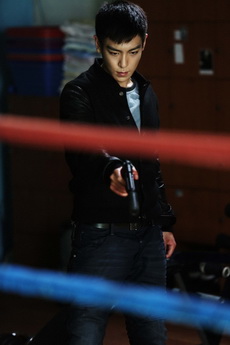 Following on the heels of the outrageous financial success of Secretly, Greatly, The Commitment, written and helmed by Park Hong-soo, previously an assistant director to Jang Hun in The Front Line (2011) and Secret Reunion (2010), adopts the same gimmick of casting a pretty-boy singer/actor in the role of a North Korean agent. Unlike Secretly, Greatly, which uses this set-up to milk comic effects or satirically comment on the ultra-consumerist (yet rigidly hierarchized) Southern society, Park goes for a straightforward inculcation of the wounded-masculinity romanticism, peppered with tear-jerking melodramatics. He manages to avoid turning the film into a humorless, lugubrious treatise on teenage alienation but cannot quite overcome the predictability of its plot and characterizations.
Following on the heels of the outrageous financial success of Secretly, Greatly, The Commitment, written and helmed by Park Hong-soo, previously an assistant director to Jang Hun in The Front Line (2011) and Secret Reunion (2010), adopts the same gimmick of casting a pretty-boy singer/actor in the role of a North Korean agent. Unlike Secretly, Greatly, which uses this set-up to milk comic effects or satirically comment on the ultra-consumerist (yet rigidly hierarchized) Southern society, Park goes for a straightforward inculcation of the wounded-masculinity romanticism, peppered with tear-jerking melodramatics. He manages to avoid turning the film into a humorless, lugubrious treatise on teenage alienation but cannot quite overcome the predictability of its plot and characterizations.
The performers are not at fault. It was a good idea to cast Han Ye-ri (trained as a dancer in real life) in the role of Myung-hoon's love interest, as her clear-eyed, refreshingly physical performance provides a nice counterpoint to the more self-contained, brooding one given by T.O.P. Jo and other veteran actors provide adequate support from the sidelines, especially Yoon Je-moon (Dangerously Excited) in one of his rare nice-guy roles. As for T.O.P., he carries the whole movie without much difficulty, evincing lethal charisma as well as acute vulnerability of an emotionally traumatized teenager with naturalness bordering on aplomb. Career-wise, he seems to be at the point where Lee Byung-heon was around 1999, right before he was cast in Joint Security Area (2000) and Bungee Jumping of His Own (2000): Choe Seung-hyun has some distance to travel before finding an appropriate showcase for his apparently not-inconsiderable talents, although he is certainly pleasing to eyes (and ears, due to his distinctive voice, another common factor with Lee).
The Commitment is not badly made: it's just too by-the-numbers. While there are more than a few moments that I like-- an advanced fight choreography that ends with a fizzing beer can sheathing a knife, non-pushy, gently soothing romantic interludes between Myung-hoon and Hye-in, and so on-- the sum total of them are ultimately unable to disparage the sense of over-familiarity that percolates around even the film's violent shoot-'em-up climax. (Kyu Hyun Kim)
Yoon-soo, a high school student from an affluent Seoul family (Kim Si-hoo, Lady Vengeance), transfers to a snowbound eastern mountain town. Sullen and unhappy on his first day at the unfamiliar locale, he notices an ethereally beautiful girl, Hae-won (Kim Yoon-hye, Ghost Sweepers) skating by herself on a frozen lake. He discovers that the mysterious girl is a subject of community-wide ostracism as well as some terrible rumors portraying her as a teen sexpot or possibly an incestuous partner to her mentally damaged father (very busy character actor Jung In-ki, The Front Line). Yoon-soo, with his own set of skeletons in the closet, helplessly falls in love with Hae-won, despite the warnings of the town's mayor (Moon Chang-gil, Masquerade) and other adults. The two enjoy secret encounters at the frozen lake, continuing skating practices until the romance blossoms. When her father's body is found with one arm missing, however, Yoon-soo is sucked into a dark spiral of violence and despair, as the townies peg Hae-won as a murderess and begin a persecution campaign.
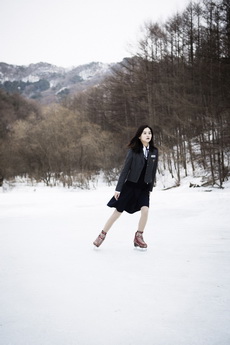 Steel Cold Winter probably suffered in terms of domestic box office performance by being (unfairly) compared to Let the Right One In (2008), a very different kind of a beast and sharing only a snowbound landscape with this subdued, emotionally delicate thriller. Director Choi Jin-sung, who had previously made a series of politically outspoken documentaries and ambitious short films (Hitch-hiking [2004], Erotic Torment Boy [2005], etc.), displays an excellent command of visual language, wrangling maximum effects out of the low-budget production design and cool, austere cinematography (supervised by Son Won-ho, Blind). He also does right by the teen romance angle, restraining the usual music-video-ish prettiness and depicting Yoon-soo and Hae-won's mating dance with a tinge of melancholy and dark foreboding. In addition, Choi manages his better-than-usual cast rather well, not forgetting to supply some breathing room for secondary characters such as Ji-yeon (Park So-dam, Ingtoogi), Yoon-soo's girlfriend wannabe.
Steel Cold Winter probably suffered in terms of domestic box office performance by being (unfairly) compared to Let the Right One In (2008), a very different kind of a beast and sharing only a snowbound landscape with this subdued, emotionally delicate thriller. Director Choi Jin-sung, who had previously made a series of politically outspoken documentaries and ambitious short films (Hitch-hiking [2004], Erotic Torment Boy [2005], etc.), displays an excellent command of visual language, wrangling maximum effects out of the low-budget production design and cool, austere cinematography (supervised by Son Won-ho, Blind). He also does right by the teen romance angle, restraining the usual music-video-ish prettiness and depicting Yoon-soo and Hae-won's mating dance with a tinge of melancholy and dark foreboding. In addition, Choi manages his better-than-usual cast rather well, not forgetting to supply some breathing room for secondary characters such as Ji-yeon (Park So-dam, Ingtoogi), Yoon-soo's girlfriend wannabe.
It is too bad, then, that Choi Yoon-jin's screenplay is ultimately derivative, and, like many Korean thrillers of this type, try too hard to make meaningful social commentaries at the expense of faithfully following the logic of the characters' behavior. More seriously, the movie fails to sell the viewers the emotional arc of Yoon-soo's character, that his guilt over the death of his old high school chum (for which he was indeed partly responsible, explained in a nice flashback featuring Ki Ju-bong as the dead boy's father) would push him over the edge at the critical moment of the film. It is not quite convincing: in the end, it felt like Hae-won's sheer misfortune for falling in with a mentally unstable dope like Yoon-soo. She could have stuck around and eventually landed another boyfriend, either pro-active enough to fix her situation more efficiently, or at least calm and rational enough to think ahead about their future together-- admittedly, the character traits singularly lacking in young male protagonists of Korean "romantic dramas" on screen or TV.
Interestingly, Steel Cold Winter is yet another Korean film that uses the horrific 2010 "disposal" of more than 3.5 million units of foot-and-mouth-disease-infected livestock (mostly pigs and cows) as a metaphor for the social problems swept under the carpet by the mainstream Koreans. There is something realistically disturbing about the subplot involving the live burial of sick pigs in half-frozen pits, although as an allegorical symbol they are a tad too obvious. Aesthetically consistent, efficiently directed and suffused with a welcome sense of genuine romantic fatalism, Steel Cold Winter is not a razzle-dazzle CGI spectacle but is well worth checking out for fans of modestly mounted yet interesting genre efforts. (Kyu Hyun Kim)
A young Christian pastor Cheol-woo (voice acting by Oh Jung-se, TV drama Miss Korea) opens an evangelical church in a mountain village, soon to be flooded and submerged underwater following the construction of a reservoir nearby. The fast-talking, oily church elder Choe Kyung-seok (Kwon Hae-hyo, Cyrano Agency) is in truth a professional con artist pulling a fast one with the villagers: he is cajoling them to sign away their life savings so that they can move into a new group home which is never going to materialize, and is even selling them bottles of bogus "holy water" as a side franchise. As it turns out, the village's black sheep, a violent, gambling-addicted thug Min-cheol (Yang Ik-june, Maruyama Middle-Schooler, Breathless), is the only one who recognizes Choe's con job for what it is: but not even his own family, least of all his horribly-abused daughter, Young-seon (Park Hee Von, Read My Lips), is willing to give any credit to his claims.
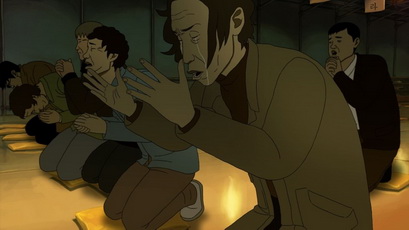 Yeon Sang-ho, the mastermind behind the powerfully disturbing if somewhat wobbly debut feature King of Pigs (2011), fulfills his promise as a filmmaker to watch out for with his sophomore effort, one that requires a strong disposition on the part of the viewers to sit through its running time. Right away as the movie opens, Choe greets Cheol-woo, grinning like an anaconda who just swallowed a doe, looks at a leashed white dog and mutters, "What the f*ck are you? Oh hey, you are well fattened up." He gives a brisk instruction, and one of his "helpers" advances to the dog with a hammer in hand. Yelp, and the dog lies dead with his skull smashed. Are you North American viewers still with me yet? Director Yeon, having established the grim tone of the film in the first five minutes, never once lets the audience escape his death-grip: but he also reveals himself to be a masterful storyteller, deftly avoiding pitfalls of excess melodramatics and crude button-pushing. It certainly requires far more precise and refined skills than those usually displayed by Korean (or American) directors, to keep his characters so relentlessly dark and almost grotesquely damaged, yet resolutely prevent the movie from drowning in its own egg-headed cynicism.
Yeon Sang-ho, the mastermind behind the powerfully disturbing if somewhat wobbly debut feature King of Pigs (2011), fulfills his promise as a filmmaker to watch out for with his sophomore effort, one that requires a strong disposition on the part of the viewers to sit through its running time. Right away as the movie opens, Choe greets Cheol-woo, grinning like an anaconda who just swallowed a doe, looks at a leashed white dog and mutters, "What the f*ck are you? Oh hey, you are well fattened up." He gives a brisk instruction, and one of his "helpers" advances to the dog with a hammer in hand. Yelp, and the dog lies dead with his skull smashed. Are you North American viewers still with me yet? Director Yeon, having established the grim tone of the film in the first five minutes, never once lets the audience escape his death-grip: but he also reveals himself to be a masterful storyteller, deftly avoiding pitfalls of excess melodramatics and crude button-pushing. It certainly requires far more precise and refined skills than those usually displayed by Korean (or American) directors, to keep his characters so relentlessly dark and almost grotesquely damaged, yet resolutely prevent the movie from drowning in its own egg-headed cynicism.
I believe the key to The Fake's success lies in its characters. They are certainly "realistic" in the sense that they accurately portray the kind of real-life figures ordinary South Koreans routinely observe around them, usually to their chagrin and righteous anger, but they also are stunningly dynamic and resist being shoehorned into easily classifiable typologies. Cheol-woo first appears as a sincere believer in God's guidance, but as the film progresses his struggle to maintain his faith despite the overwhelming sense of guilt and responsibility warps his psyche like a metal rod exposed to extreme heat. Min-cheol, on his part, is such a hideous monster- his mental and physical abuse of Young-seon and her first desperate, then hollowed, reaction are truly heartbreaking- that the viewers are torn between a desire to see him ground into human pulp by his enemies on the one hand and a wish to see him somehow redeemed to, if not a heroic status, at least a measure of relatable humanity, on the other. Even the serpentine Choe Kyung-seok is not a cardboard villain. He is so smoothly confident in his contemptuous view of his prey that the viewer is somehow drawn into his perspective as well, seeing the victimized villagers as irritating, small-minded dunderheads and viragoes well deserving of their ultimate fate.
Voice actors, especially the veteran Kwon Hae-hyo, flawlessly embody these multifaceted characters under Yeon's sensitive direction. Amazingly, the fact that these characters are essentially rendered as animated 2-D cartoons, enhances, rather than weakens, the power and intensity of their performances. Yeon's aesthetic regime is similar to one adopted by Okiura Hiroyuki and Oshii Mamoru in Jin-roh: The Wolf-Brigade (1999), eschewing flashy, exaggerated expressions on the part of his personages: the film's environment is rigorously functional, characters move with certain stiffness, and little in the movie really calls attention to its nature as an animated film. Yet these tactics of simplification and pragmatism add, rather than detract, a sense of urgency to the film's set pieces, themselves almost entirely derived from spiritual and emotional clashes of characters rather than some plot contrivances.
In particular, The Fake has one breathtaking sequence in which Cheol-woo confronts Min-cheol with a letter written by Young-seon, in which she claims to forgive his lifelong abuse of her and her mother: Min-cheol's iron will to remain absolutely indifferent to welfare of other human beings finally appears to break down at this, as he crumbles to the floor, howling and weeping. However, the sequence unfolds in such a way that we learn, to our abject horror, that Min-cheol's resistance to Choe's manipulative scheme and Cheol-woo's entreaty to embrace an unconditional faith is not founded on his rationality, but on the pitch-black despair, his absolute refusal to imagine the possibility of unconditional forgiveness and reconciliation. This is a truly Dostoyevskian moment, in which a confrontation of two tormented souls send vibrations all the way up the scale of our awareness of human predicament, like a plucked string of a musical instrument. The movie inexorably culminates in a horrific, moving yet utterly logical denouement that leaves room for more than one interpretations as to its ultimate theological and moral stance.
After watching The Fake, I felt like some brute has punched my face a couple of times during screening, but also felt elated and enlightened in the way only possible after having been exposed to a genuine work of art, like a great modernist novel by writers like Lee Chung-joon (the author of the novel "A Bug Story," adapted into Lee Chang-dong's Secret Sunshine). By relentlessly focusing on letting his complex, realistic yet archetypal characters interact with one another with a full measure of integrity, Yeon Sang-ho turns his second animated film into a marvelous tour de force and in the process pushes himself to the top rank of Korea's talented filmmakers. (Kyu Hyun Kim)
Dr. Jeong Woo-suk (Jeong Jae-yeong, Broken) leads a team of Korean scientists and technicians in a Russia-financed project to create an artificial wormhole that will enable time travel. Team members include two young scientists in love, Yeong-eun (Kim Ok-vin, Thirst) and Ji-wan (Daniel Choe, Cyrano Agency), a cute analyst Namgoong Sook (Sin Da-eun,The Cat) and an equally cute technician Kim Moon-joon (Lee Geon-joo, Almost Che), a grumpy, cynical engineer Park (Park Cheol-min, Blood Rain) and a liaison officer with Russians Mr. Jo (Lee Dae-yeon, Camel(s)). Three years later, Jeong has indeed found a way to travel into the future. The catch is that the wormhole's integrity can be sustained for only 15 minutes, and the maximum time range they can travel is 24 hours. Before the disappointed Russians shut down the project, Dr. Jeong and Yeong-eun rush through a trial run in the time machine nicknamed "Trotsky."
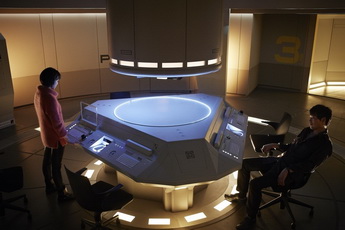 However, something goes horribly wrong. Only one day has passed, yet the entire lab seems to be in total chaos. Someone tries to strangle Dr. Jeong: Yeong-eun was seemingly left stranded in the future yet is later found smuggled inside Trotsky. Dr. Jeong and his teammates attempt to figure out what happened in the intervening 24 hours by looking into the CCTV files copied from the mainframe computer of the future: but things turn toward the worse as the recovered files show more inexplicable mayhem.
However, something goes horribly wrong. Only one day has passed, yet the entire lab seems to be in total chaos. Someone tries to strangle Dr. Jeong: Yeong-eun was seemingly left stranded in the future yet is later found smuggled inside Trotsky. Dr. Jeong and his teammates attempt to figure out what happened in the intervening 24 hours by looking into the CCTV files copied from the mainframe computer of the future: but things turn toward the worse as the recovered files show more inexplicable mayhem.
I must confess I initially had rather low expectations for 11 A.M., to the point of thinking of avoiding it altogether. Even though I am a fan of director Kim Hyun-seok (Cyrano Agency, When Romance Meets Destiny, YMCA Baseball Team), an SF thriller (as usually understood by Koreans) seems to be the genre farthest from his strengths-- warm and compassionate characterization, intelligent humor, and an ultra-sincere, guilelessly romantic view of human relationships. There appeared no way for him to avoid typical pitfalls of Korean filmmakers tackling SF: keeping the external trimmings of the genre to keep the film look "Hollywood-ish," while re-hashing the same ol' unimaginative, sticky stories of romantic entanglements (Bong Joon Ho is one glaring exception to this, who proves the rule). Time travel, especially, has been exploited in New Korean Cinema as a key device that allows protagonists to magically reach out to their pasts (in this sense, a narratologically complex film like Architecture 101 is almost a time-travel movie for many Korean viewers). Koreans have shown little predilection toward making the cause-and-effect mess-up that inevitably turns out to be the outcome of a fictional time travel into their main theme, as in Timecrimes (2007) or Primer (2004).
To my surprise, I found 11 A. M. perfectly watchable, although as perhaps expected, it is Kim Hyun-seok's most anonymous film, stripped of the light-footed witticism of his best works. However, the film, adapted from the screenplay by Lee Seung-hwan (Soo) by a couple of comedy specialists and director Kim, does not cheaply play off genre thrills like, say, Sector 7, and takes its premise totally seriously. The viewers are invited, along with the characters, to figure out if they could cheat what appears to be the pre-determined fate of doom and destruction, generating considerable cerebral suspense, mostly in attempting to identify what character flaws or qualities would (ironically) lead which cast members to their demise. The production design and special effects are also surprisingly robust, mostly because director Kim keeps a tight rein on keeping everything rigorously earthbound and naturalistic: the time machine itself is a simple metallic decahedron, minus Gothic excesses of American SF-horror blockbusters like Event Horizon (1997), and the overall atmosphere intriguingly feels like an updated version of an old Eastern bloc science fiction, what with all technical lingoes in Russian rather than English.
As for the film's engagement with its scientific premise, it lands somewhere between a geek's cryptographical delight like Primer and a gaudy romantic fantasy like Somewhere in Time (1980), as a cautionary tale based on the theory of Schroedinger's Cat. It does not really offer new takes on the larger ontological question of fate vs. free will, but I think it is too harsh to hold that against Kim and his crew: Looper (2012) and X Men: Days of Future Past (2014), to name two recent well-received American SF films, likewise play fast and loose with this issue after all (Director Kim's alternate ending, which drastically veers the film down toward the feel-good fantasy territory, is more typically "Korean" and I for one am glad it was abandoned).
Characterization is a mixed bag: Dr. Jeong, who seems to be partially based on the notorious Dr. Hwang Woo-suk, is given a hackneyed backstory involving an estranged wife who had committed suicide, and Jeong Jae-yeong can only do so much to make the viewers care about this egocentric, whiny nerd. Kim Ok-vin is actually believable as a super-smart young scientist but is otherwise too withdrawn and reticent: she is, for instance, unable to bring conviction to a key latter-half scene that resolves the mystery of her return to Trotsky. On the plus side, all characters behave according to identifiable psychological motivations, instead of going randomly crazy under pressure, as in most jeopardy-in-space/deep sea SF opuses of this kind.
Near the film's climax, Kim Hyun-seok inserts a brief montage sequence that fills in the gaps in the main character's network of relationships, and it beautifully showcases what Kim does so well as a director: economical storytelling skills put in service of depicting the emotional truths of his personages. Unfortunately, the rest of the movie lacks his personal touches like this. 11 A.M. is a fine, well-made SF thriller, but it tantalizingly stops at the level where it is merely competent: unlike Kim's better works, it leaves your heart at, shall I say, a little lower than the room temperature. (Kyu Hyun Kim)
Director Yang Woo-seok's The Attorney begins with heartwarming, gentle drama, and ends in righteous anger. That is not the usual trajectory for a commercial film. Nonetheless, The Attorney was a huge commercial success, with over 11 million tickets sold. In this and other ways, this is an unusual movie that requires a bit of explanation.
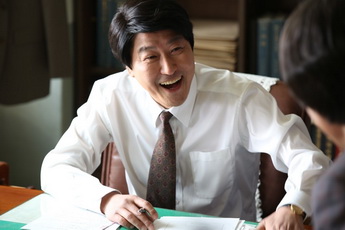 Let's start with the plot. The preternaturally talented Song Kang-ho plays the lead character of Song Woo-seok, who is just beginning his legal career as the film opens. It is the early 1980s, under the military government of autocrat Chun Doo-hwan, but Song is not much interested in politics. After being mocked by his colleagues due to his lack of a university degree, he hits on the idea of providing legal advice to taxpayers. Soon, he is one of the most sought after attorneys in Busan.
Let's start with the plot. The preternaturally talented Song Kang-ho plays the lead character of Song Woo-seok, who is just beginning his legal career as the film opens. It is the early 1980s, under the military government of autocrat Chun Doo-hwan, but Song is not much interested in politics. After being mocked by his colleagues due to his lack of a university degree, he hits on the idea of providing legal advice to taxpayers. Soon, he is one of the most sought after attorneys in Busan.
All goes well for Song until a soft-spoken university student, the son of a close family friend, is arrested by the police. The boy is accused of being a communist sympathizer, and mercilessly beaten. Suddenly, Song is wrenched out of his comfortable, routine existence, and he agrees to defend the boy out of personal loyalty. But in the course of preparing for the trial and presenting his arguments, a powerful sense of idealism and moral outrage takes hold of him.
Observant viewers might notice that the main character's name is a combination of the actor's family name and the director's given name. This invented moniker is an acknowledgment of the fact that Korean viewers all had a different, real-life name running through their heads as they watched this film: Roh Moo-hyun. A human rights lawyer turned legislator, Roh was elected president of South Korea in 2002. His election was greeted with an euphoria among younger, progressive Koreans not unlike that stirred up by Barack Obama in 2008. But even more so than Obama, Roh's five years in office were punctuated by sharp disappointments. A little over a year after returning to civilian life, Roh committed suicide. In South Korea's current political climate, which has swung far to the right, his memory still conjures up raw emotions.
The Attorney is based on Roh's early life, and his gradual development of a moral and political compass. The film may lack dramatic plot twists, but there is always great drama in watching a character transform onscreen. And thanks to good storytelling and brilliant acting, this film captures that process beautifully.
The Attorney admittedly has a complicated relationship to Korea's former president. Roh Moo-hyun is never mentioned explicitly in the film, and Song Kang-ho's performance is not meant to reproduce Roh's image down to the smallest detail, as Meryl Streep did with Margaret Thatcher. The story is slightly fictionalized. But the film turned out to be a highly emotional viewing for Koreans who miss Roh's eloquence and idealism.
You don't need to be Korean, or to remember Roh, to be moved by this film. The story pulls you in and is easy to relate to, even if you're not familiar with the social backdrop. More than anything, it dramatizes in a powerful way what it means to fight for your ideals and to "speak truth to power." It's not so much the case that the film provides hope, because in many ways it reminds you of the fact that this sort of idealistic resistance is more and more difficult to find in today's world. But it does provide some bittersweet comfort and - yes - inspiration. The term "inspiring" is hugely overused in popular film reviewing, but in this case, the word fits. (Darcy Paquet)